#here ends my essay
Explore tagged Tumblr posts
Text



Owari really popped off with this gay ass design he’s so pretty and beautiful
#I love blonde boys his hair looks so pretty#u know his conditioner game is REAL#the slight ombré and the ahoge are so cute#his outfit?? moreso s1 I prefer it a lot more than s2#the fact that under that fruity cape with a bow he’s wearing that black shirt….#this is ur causal wear? cray#AND THE THIGH HIGHS#gayest design ever#which makes sense for a vampire this hung up on his childhood crush#‘the only man I’m living for’ DUDEEEE#mikayuu was like my first ever ship when I was 12 and I loved ons#I love u mika#here ends my essay#ons#owari no seraph#seraph of the end#mikaela hyakuya
25 notes
·
View notes
Text
Dungeon Meshi episode 21, being heavily dialogue-driven, was pretty straightforward animation-wise and let Ryoko Kui's stunning art speak for itself for the most part, but that doesn't mean that there aren't still some GENERALLY-INSIGNIFICANT-DETAILS-TO-SCRUTINIZE-AT-ARGUABLY-UNNECESSARY-LENGTH.
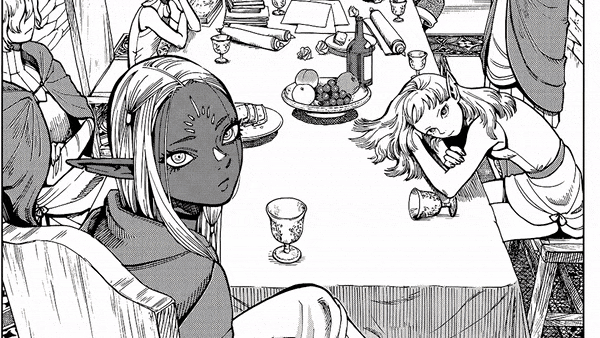
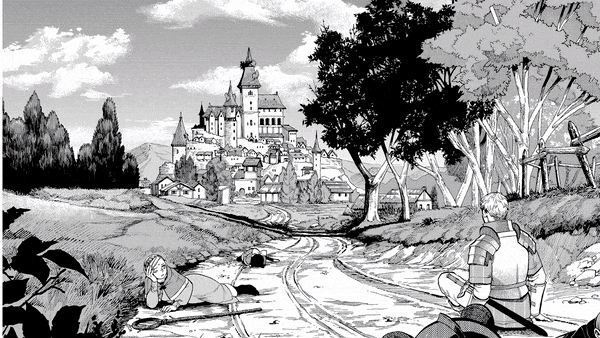
There was a strong emphasis on hands in this episode, particularly the second half, starting with this cut of Laios resting his on the Minotaur's snout.
The animators have taken this simple little panel (on the right) from the manga (btw, people who know more about this than I do, is there a name for this type of panel, which in film would be called an "insert shot"?)
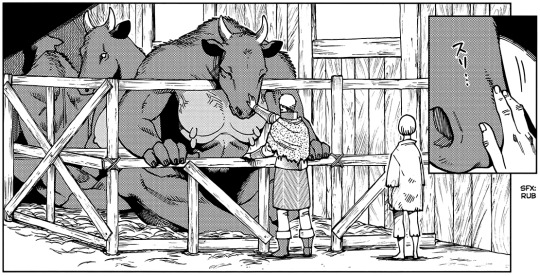
and turned it into this highly detailed tracking shot that heightens the emotional impact of this moment for Laios. It feels very similar to the shot of Kabru bringing a piece of fish to his mouth that introduced him to the series!
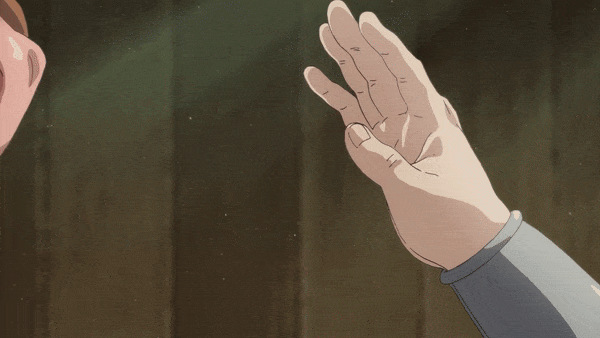

The theme comes up again when Laios does a little bit of blair-witching in the corner after being rejected by house-kitty-pilled Izutsumi,

and once again a few seconds later with this added close-up of Marcille's hand when she tries to read the magical aura of the area.
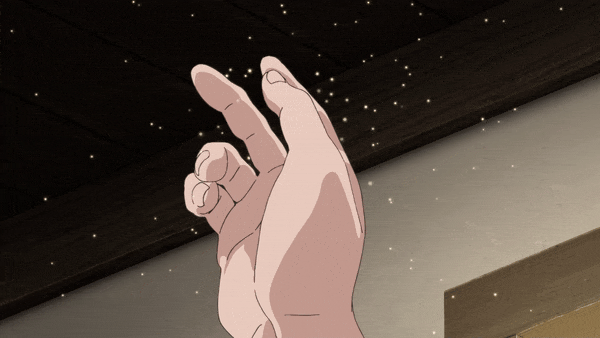
This one clearly makes heavy use of reference footage, to the point that it almost looks rotoscoped until you notice little details like this line that warps unrealistically at the heel of her palm.
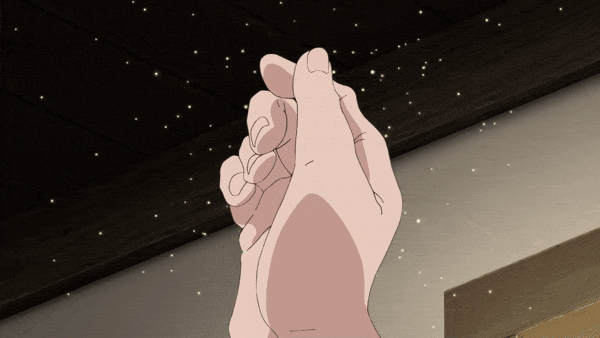
But with smooth, realistic motion like this, little details like that are much less important than the overall feeling of authentic shape and movement. This can be seen in a lot of Masaaki Yuasa's work, which often favors consistent motion and more frames over super polished individual drawings. Here's a thematically appropriate cut from Ping Pong for example:
(This one might actually be rotoscoped, I'm not sure)
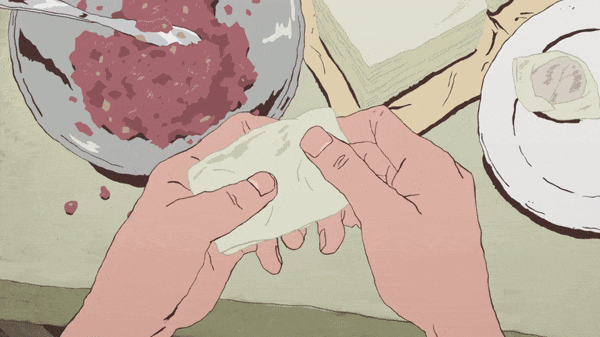
If you pause on any individual frame, the lines look wobbly and inconsistent, but it comes together as a whole to create something that feels authentic - real.
The heavy detail in the hand anatomy and the way the skin wrinkles around the knuckles in these cuts feels like a hard departure from Studio TRIGGER's signature heavy stylization, but these realistic cuts have popped up here and there since the start of this show, and I think they fit Dungeon Meshi really well! It can be jarring go straight from wacky bombastic cartoonsmanship to realism, but while it is a show about the hungriest hungriest himbo and his family of weirdos, it's also simultaneously a show about anatomy, ecology, and the horrors of the human mindbrain.
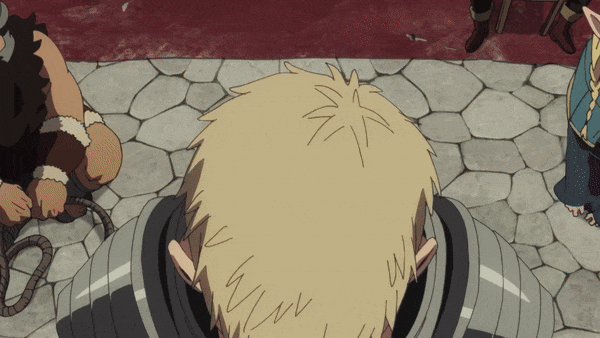
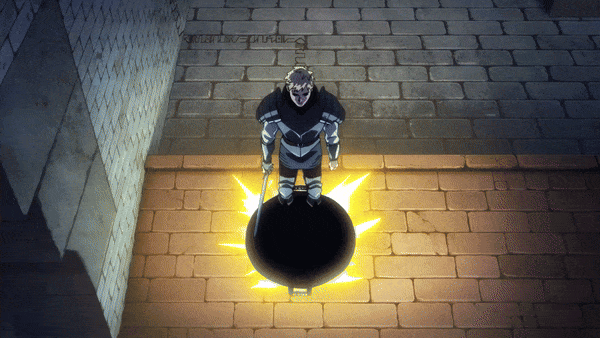
This was expanded from an excerpt from this video where I break down the whole episode, so if you want to continue wallowing in the sludge with me, consider checking out the video!
Thanks for reading.
youtube
#I feel like whenever I take an excerpt from my video scripts to turn into a post on here it ends up more fleshed out and over all better#because I have more time to think about it but also because I know some people on youtube will get mad if I talk about hands for 10 min XD#dungeon meshi#animation analysis#laios touden#marcille donato#mini essay#youtube#video#original#Youtube
658 notes
·
View notes
Text
Equally Invalid
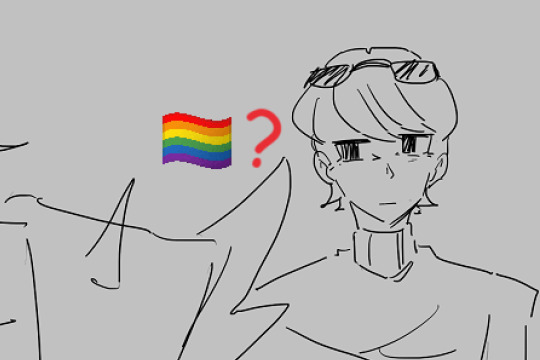
#trafficshipping#smallidarity#<- shipping rlly isn't the main main focus here but it ends on the kiss so I'm scared to tag anything else lol#cw blood#my art#animatic#it's more like. visuals for character analysis thoughts. because this is way more fun for all of us than writing it all out as an essay#I don't expect you guys to. Get it btw or at least not all of it alot of this is very self indulgent and jumps around the timeline#it's like 99% just for me but still. I hope the smallidarity enjoyers of the world can get smth out of it at least lol#very very very happy for ppl to ask abt specific scenes if ur interested ofc#I prefer not to spell out what things mean cus like. It's more fun for me thinking of ppl applying their own thoughts onto my stuff.#but if you ask I will yap forever god bless#if you want you can play a game of spot the jojo reference. and spot the utena reference#ANYWAY YEAH WOO scott and joel content yes yes yes woo!!!!#do they have a duo name like. at all. is that a thing#happy pride everyone
435 notes
·
View notes
Text
“So how did you know?”
“Know what?”
“Y’know, how did you know.”
“Dingus, I’m gonna need you to spell it out for me here, the Russians did a number on how many of my braincells are actually working.”
“How did you know that you liked girls?”
Robin Buckley immediately pushed herself up so she was resting on her elbows, head tilted to catch Steve Harrington’s eyes in the low light of their hospital room.
They weren’t originally even going to go to the hospital, if Robin was being honest. They had just wanted to slip away back to their respective homes, but then Melissa and Richard Buckley caught wind that Robin was hurt. Then the both of them realized that Steve’s parents (if Robin has to use that term to describe them) had less than zero intention of sending anyone to pick up Steve.
Then EMS made the light suggestion of both of them probably needing to go to Hawkins General Hospital… and well, while Melissa and Richard did tend to lead toward more natural remedies… one couldn’t fix a concussion or a drugging with an unknown substance with essential oils and hope.
“Robbie? Did you OD over there?” Steve had himself up on his elbows, easily mimicking Robin. That’s the thing that makes the inside of Robin ache, that he’s so like her. She knows that she’s an only child, knows that, but sometimes Steve’ll just… do something and it makes her question it. Makes her wonder how she spent so long without him, without another brain and two legs and arms and so much hair. “Robbie?”
“No, I am still alive.” Robin slowly spoke, before she let out a soft sigh. “Why do you ask?”
“Like-” Steve huffed as he shook his head from side to side, before he used the one hand that was free from the pulse monitor and saline drip to card through his hair. It’s sleep ruffled, and if he uses product (Robin is sure he does), it’s for sure gone. Steve looks up though, and his eyes are so earnest that it causes something to hurt inside of Robin. “never mind just ignore- fuck - just ignore me.”
“I couldn’t ignore you if I tried, you idiot.” Robin let out a huff, and she winced as the PICC line in her arm shifted as tilted to be able to fully face Steve on her side. “But I just, dingus, this is out of left field for even you.”
“How so?”
“Did you even know that, that people like me even existed until a couple of hours ago?” Robin kept her voice soft, especially as Steve huffed out an indignant sounding sigh. Robin sighs though, and then she cards her own hand through her hair, and forges onward. “I think I’ve just… always known.”
“Always?”
“Yeah like-” Robin shrugged, a careful movement of her shoulders. “When I was like, eight? My uh, parents sent me to this camp thing- like summer camp kind of like what Dustin went to? But with, y’know, with the swimming and archery and dude I was fucking awful at it.” Steve let out a soft and watery laugh at Robin’s rambling, and that gave Robin enough power to continue. “But we uh, had these like songs we had to learn? And there was this uh, girl counselor there that had to teach me because you know, that was her job.”
“Yeah?”
“Yeah, and uh. She couldn’t have been older than I am now but man…” Robin let out a slow whistle, and allowed herself to fully melt into the hospital cot she’s laid up on. “All I could think was that I just wanted to be with her. Like not even kissing because I thought kissing was gross then, still do now kinda but anyway- I wanted to like, hold her hand and shit. Do the cheesy stuff I’d seen in the movies, y’know?”
Steve huffed out his own laugh, and he tilted his head to lean against his pillows instead of facing Robin. Robin watched though, quiet for once, as Steve swallowed once and then twice- before he cleared his throat.
“I knew it existed before you.”
“What?”
“It.”
“Dingus-”
“Girls liking girls.” Steve’s voice is barely above a whisper, even as Robin can hear him gulp in a lungful of air. “And boys liking boys.”
“You did?” Robin kept her voice quiet, gentle, as coaxing as she could- especially when she could see Steve’s throat bob. “Dingus?”
“I…” Steve doesn’t continue, and that’s enough.
Enough to Robin that she pushed herself up, and ignored the pain that ricocheted down her spine like needles. Ignored Steve’s hurried ‘what are-’, as she stumbled out of her hospital bed and right to Steve’s. She made sure to drag her IV pole and the monitor with her, situating it as best as she could next to Steve’s. Robin huffed quietly as the pain trickled down her spine, and she couldn’t help but smile as Steve curled his hand carefully around her wrist and tugged.
Robin got comfortable, let Steve fret over her as best as he could, his fingers only ever-so slightly trembling as he made sure that the line in her arm wasn’t kinked up. They were pressed close, side to side and hip to hip, and Robin tilted her head down until it was rested on Steve’s shoulder.
“Wanna keep going, Stevie?”
“No.”
“But?”
“I…” Steve huffed again, a small indignant noise that Robin mimicked.
They sat like that then, just the two of them for a moment, before Steve continued slowly.
“I’ve never, told anyone this- like I’ve told Tommy H. so much shit about me - but this is… Robin this is different.” Steve speaks in a hurried and stilted way, like he’s stringing together bits and pieces of sentences, and it shouldn’t work.
But it does because he’s Steve and she’s Robin.
And truthfully, Robin likes that. That they’re Steve and Robin. SteveandRobin. RobinandSteve. Likes that the two of them are so in tune that even her own mother didn’t want to separate them.
That had to mean something in the end, didn’t it?
“Tell me, whatever… whenever.” Robin murmured as she turned her head so she could press a soft kiss to Steve’s shoulder. The hospital gown is thin enough she can feel the heat of his skin from up under it, and that’s grounding. Grounding even as Steve drew in a shaky breath, audibly swallowing again. “Whenever you’re ready, I’m here.”
“I didn’t uh, notice Tammy in Ms. Click’s class or uh, you for a reason.” Steve slowly spoke, eyes wet, and Robin can hear his sniffle as he tried to reign his emotions back. “Ms. Click made him sit uh, right by her desk at the front of the room.”
And oh.
Oh.
If that doesn’t immediately settle something that just usually writhes around in Robin’s chest.
“Him?” Robin is gentle, gentler than she thinks she’s ever been.
“Uh, yeah… Eddie Munson?” Steve huffed out an almost dry laugh, the only thing that he does that ever remotely reminds her of his time as his high school “King Steve” persona. “He uh, got this bat tattoo right before that year’s Thanksgiving break and all I could do was just… gawk at him.”
“And then what?” Robin knew she was pushing, searching for information, but she can’t help it. Not when Steve is right next to her, hip to hip and thigh to thigh. Not when he’s like her. In all the ways that matter.
“I went home and screamed into my pillow.”
Robin immediately smacked Steve’s thigh with the knuckles of her left hand- grinning in triumph when Steve let out a squawk of laughter.
“Eddie Munson?”
“What about him?”
“He’s… he’s a total dud!”
“No he’s not!”
“He stepped in my mashed potatoes once! That is totally total dud material!”
“No way!”
“He wants to be like, like a metal singer!”
“He has a band! Dreams!”
“Do you even know if he can hold a tune?”
“Well, no-”
“Total. Dud.”
Robin grinned wide as Steve launched into a very quick defense about Eddie, and she decides then and there that Steve and her? They’ll be just fine.
Especially if she can get Eddie to come into Steve and her’s orbit just a bit, to see if the crush is still there.
Because while Robin may not have all of the gay knowledge in the world, there is one thing for a complete certainty that she knows.
The black hanky that Eddie kept in his pocket?
Well…
Robin chuffed to herself, before she tilted so she could lay on her side- nose tucked into the place where Steve’s neck and shoulder met.
Right before she falls asleep though, Robin does a very important thing on a mental whiteboard.
You Rule: 1
You Suck: 0

hope you all enjoyed! truthfully think this is one of my favorite things i have written. love platonic stobin. <3
#angeldreamsoffanfic#steve harrington#robin buckley#steve and robin#robin and steve#platonic stobin#stobin friendship#codependent stobin#steve harrington and robin buckley are bffs#eventual steddie#steddie#steddie ficlet#richard and melissa buckley saw steve sitting in the ambulance with robin and went oh we have a son now#steve harrington has bad parents#but he has the buckleys now <3#fleshed out robin buckley’s gay awakening#the counselor was named in my head but it didn’t make sense to fit it in here (her name was maddie)#robin likes girls where there name ends in something that sounds like the letter ‘y’#exhibit a: tammy exhibit b: vickie exhibit c: nancy exhibit d: chrissy#in this essay i will#stobin ficlet#platonic with a capital p#sometimes i tag things and then forget other (see more important) tags#sorry y’all
2K notes
·
View notes
Text
Rereading Dressrosa for the first time in quite a few years, after having become a Crocodad Truther specifically, was a really interesting experience, mainly due to the relationship between Kyros and Rebecca and Luffy's very strong feelings about those two in particular
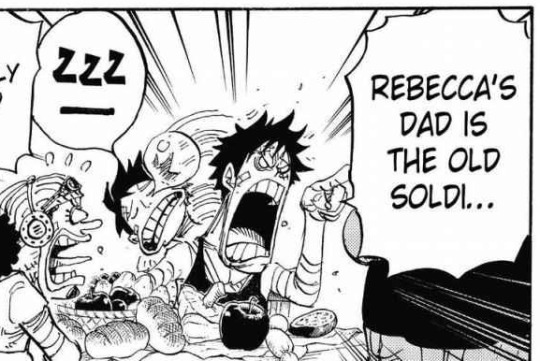
Starting with the latter point; watching Luffy get really passionate about making sure Rebecca reunited with her father, instead of the two never seeing each other again as Kyros had planned, was just really facinating to me.
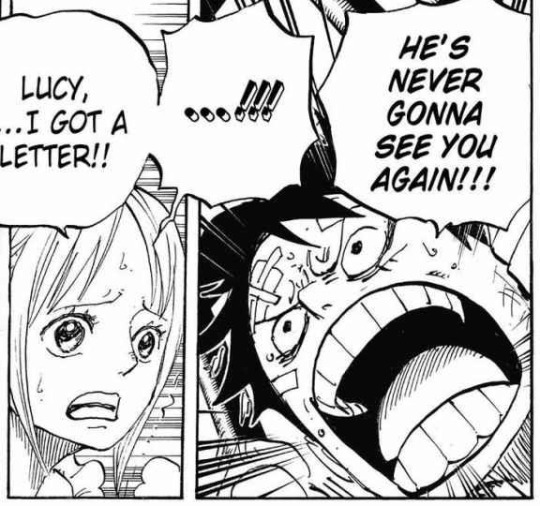
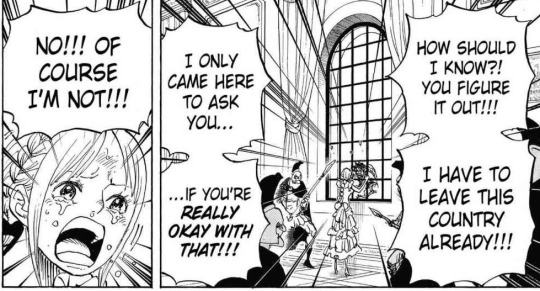
Now there ARE layers to this; Luffy saw first hand how much Rebecca and Kyros love each. Even if he didn't know or understand all the details, he knew these two were family forced to live apart due to Doflamingo's rule and that, even though Rebecca didn't know Mr Soldier was her father all those years, he still looked after her and did all he could to protect her. Luffy understands how much they matter to each other. Luffy also gets that Kyros was trying to make a sacrifice out of self-loathing; Kyros saw himself as a bloodstained monster who did not deserve to be by his daughter's side, thus his insistence on them going their separate ways. But not only is that "sacrifice out of loathing" not a thing One Piece rewards within the narrative*, but Luffy emotionally understands what Kyros was trying to do was stupid as hell. *(See; Robin trying to save the crew in the CP9 Saga, Sanji trying to offer his head to Kuma to spare everyone else (because he saw himself as the "least worthy", compared to Zoro who believed he was the only one who could actually tank Kuma and survive), Sanji again during Whole Cake Island, etc)
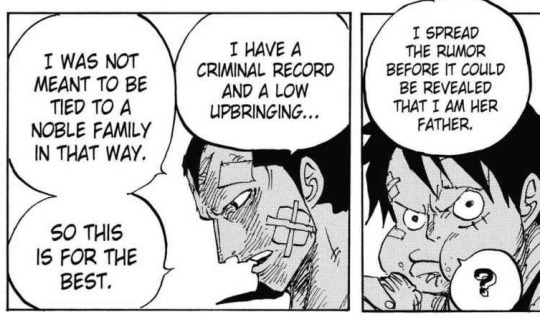
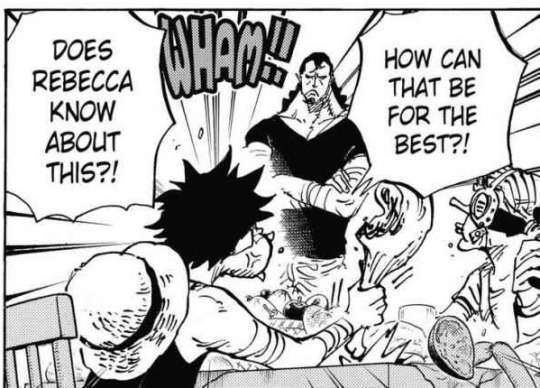
Adding to that, in what I feel also harkens back to Alabasta (vaguely important since Dressrosa in many ways is a reflection of Alabasta); Vivi made her decision to stay in her home because that's what she wanted deep in her heart, because she loved her country. Just the same way, dethroning Doflamingo, getting revenge for her mother and reuniting with her extended family were all fine achievements. But all Rebecca wanted deep in her heart was to stay with Mr Soldier (regardless if he was her father or not). That's what mattered the most to her.
How could Luffy even think about leaving without making sure Rebecca was able decide on her own if she wanted to stay with her father, instead of him making that decision for her, not because it was truly "for the best", but out of Kyros' own guilt and self-loathing.
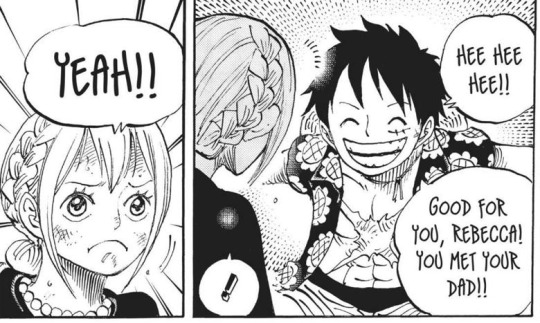
All of that to say; Luffy becoming so emotionally involved in Rebecca and Kyros' father-daughter relationship is perfectly normal and on-brand for him, it's not strange at all.
...At the same time. I could not help but to wonder if those two's relationship could somehow reflect Luffy's relationship with his estranged parent(s), and more importantly, kind of debunk the fandom idea of Luffy as someone who 100% does not care if people are related or not and has ZERO interest in Dragon etc
Like I have discussed this before but I've been meta posting for so long on here I'll repeat myself just a lil; I feel like it's less "Luffy doesn't care Dragon is his father" and more "Luffy doesn't know HOW to feel about Dragon". We don't know what Garp told Luffy about his parent(s), presumably and based on the conversation post-Enies Lobby it just seems like Garp never mentioned ANYTHING to Luffy? Like he didn't even tell Luffy a white lie about why his parents weren't there for him? We simply do not know. But what we do know is these three things: 1. Luffy hates being alone, even more than "being hurt". Being alone is his worst fear 2. Although Garp was responsible for raising Luffy, he wasn't always there, meaning other townspeople and Shanks' crew alike were equally "responsible" for looking after Luffy. 3. Meaning Luffy was essentially an orphan. Fans will joke about Luffy's surprise at him having a father being because he's stupid, an asexy and doesn't know where babies come from, and while I may not be fully able to debunk that conceptually. Like. It's just as possible that because Luffy was raised like an orphan, he might have assumed that either his parents were dead or had abandoned him because they didn't want him. And I'm going to argue that if that's what Luffy always assumed was what happened, yeah, it'd contribute to his fear of being alone. It'd explain why he'd be surprised to find out he actually does have a father out there somewhere. And yeah, Luffy might not know how to feel about Dragon if that's the case. Should he hate Dragon because he wasn't ever there for him (from Luffy's POV)? Why wasn't Dragon there for him? Did he really not want Luffy, or did he have some reason for leaving Luffy? What is he like anyways, is he nice or cool or a dickbag?? Should Luffy even care about any of that stuff??? All of that to say; I don't think Luffy is completely disinterested in Dragon, I think he doesn't know how to feel or think about Dragon, and it's not relevant to Luffy right now anyways because Dragon's like, out there somewhere while Luffy is on his journey. Where as, if Luffy were to meet Dragon, get to know what he's like, why he wasn't there for Luffy and most importantly, how he feels about his only son (does he care about Luffy and his wellbeing? Is he a Kyros or a Kaidou?)- yeah, I think then Luffy COULD learn to be interested in Dragon and care about him Not out of obligation (because of their blood) but out of Luffy's own will, out of Luffy's acknowledgement of Dragon's love for him
And yeah, then we get to add the ever-delightful layer of Crocodad Trutherism to this mess.
You know how my personal theory goes; that Crocodile's been trying to find a way to overthrow and nuke the WG (potentially with an Ancient Weapon) to make sure his long lost child would be able to live freely and do whatever the hell he wanted without having to fear the WG would ever target him because he has Evil Revolutionary Leader Blood coursing through his veins. That's what makes the most sense to me as Crocodile's ultimate motivation. To protect his child, no matter the cost, even if he had to become the devil himself.
And hey, what was the story between Kyros and Rebecca again? Kyros trying to overthrow a corrupt government (a fallen Tenryuubito to boot) to protect his child so she could live freely without having a target on her back?

I don't need to explain how One Piece does have repeating themes and motifs, surely. (Also there's something to be said about fathers in One Piece who would go to hell and back for their daughters, Kuma being another example, but that's a whole different essay. But Oda's Girl-Dad Agenda is showing)
But yeah, what's even more interesting here is how Kyros believed he didn't deserve to have a reunion with Rebecca. He commited a murder decades ago, and although everyone else seems to have forgiven him for that crime, Kyros himself still thinks of himself as a horrible murderer with bloodstained hands. Not helped by how Kyros thought him teaching Rebecca self-defence skills was a failure on his part as a father (instead of him doing all he could in the horrible situation they were stuck in; teaching Rebecca how to defend herself was absolutely justified, and Kyros shouldn't have blamed himself for anything there).

Kyros didn't think he deserved to be with his daughter because he wasn't a good father, because was a monster. And Kyros could not believe anything other than that until Rebecca essentially forgave him, by explicitly telling him she wanted them to stay side-by-side. That she wanted him, and no one fucking else, as her father.
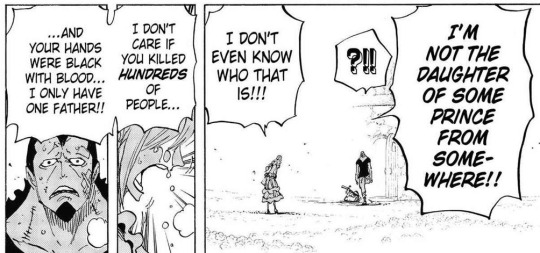
And I once again repeat myself just a little as I ask; how would Luffy feel if he found out Crocodile was his father? How would Luffy feel if he found out the reason Crocodile was going to destroy Vivi's country was because he was trying to protect his son from the WG? And that son was Luffy himself? How would Luffy feel that the asshole who stabbed him through the gut, mummified him and poisoned him was his very own family? Who also saved Luffy's life the second he learned of their blood connection? How would Luffy feel in that situation, if he found out Crocodile cares about Luffy, and wants him to be okay? And how does Crocodile feel? After stabbing Luffy through the gut, mummifying him and poisoning the brat, does Crocodile feel like he has any right to call himself Luffy's parent, let alone father? He knows Luffy rightfully hates him for all the horrible things he has done, how could Luffy ever accept him?
The past is in the past and it can't be changed. But you always have the choise, the free will, to change yourself and become a better person. You can choose to do better things, to help others and be kinder. You can have a second chance.
Robin was given a second chance. Hacchi was given one too. Kyros was given that chance to become better. So why not Crocodile?
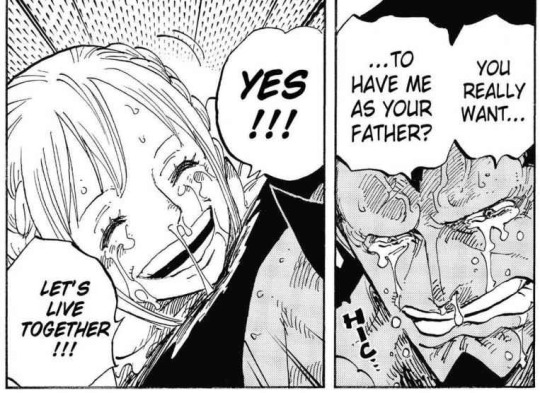
#Moon posting#OP Meta#Crocodad#Probably could have reread like this two more times to try to spot any lingering typos but YOLO#The -1 point to Crocodad here would probably be that at least my speculated version of Crocodad could be a bit too repetetive even for OP#But that does kinda depend on how it's delivered in the end (like god knows I can't imagine Luffy wanting to live with his parents LMAO)#Or perhaps my speculated version isn't accurate#Ultimately my point here is that if Oda has written this kinda story before already in OP then it doesn't make Crocodad like unrealistic#Like it absolutely could be something Oda would write#TIME WILL TELL#Anyway yeet a short essay be upon ye
134 notes
·
View notes
Text
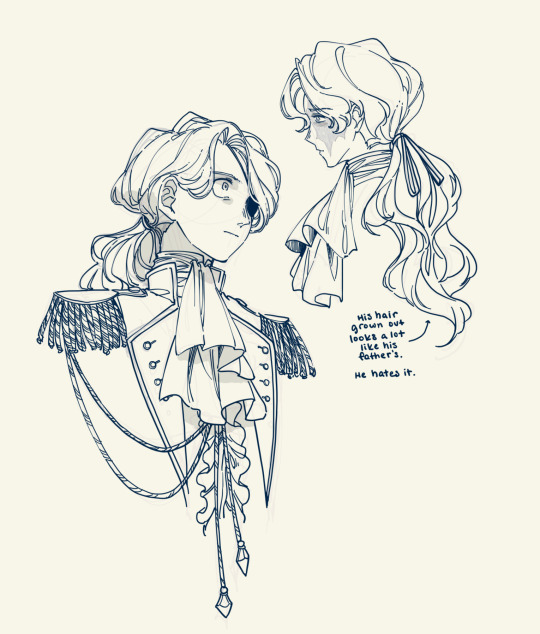
Procrastination doodles of sabo for the king sabo au :)
#one piece#sabo#king sabo au#I wonder sometimes if I keep thinking about this au because i like putting my blorbo through crushing existential nightmares#something something. it must feel so wrong to him. to be born like this and know that he’s not suppose to be there#but not having the memories of times in the wild with his brothers to contextualize why he feels wrong or where he’s supposed to be instead#directionless. knowing that he has to exist for some reason but not the reason that everyone around him tells him he should exist for#and continuing to try to bridge the cognitive dissonance through fallacy after fallacy until he is in too deep to escape#anyways. thinking about Him#Him is the academia mentality of ‘just keep going and you’ll eventually reach the light at the end of the tunnel’#��because you’ve tried so hard to get here and surely you must belong here because you’re so academically highly-achieving’#does that make sense? maybe the parallel is a bit of a reach. I could write an essay about it tbh#I love this au lmao it’s both a lot of projecting and a great chance to be like ‘god I can make him so much worse’
504 notes
·
View notes
Text
I think that the party's communication issues can be summed up as "man, is it awkward to tell someone that you want to spend the rest of your life with them if you've only know them for a few months? Probably."
#isat#isat spoilers#in stars and time#listen they will kill for each other but also its such a short time???? like??? thats part of the tragedy tbh#like!!! yeah theyll go back to their previous lives bc who in their right minds throw out everything they were doing before for people youv#only known for a few months and it turns out all of them do bc theyre insane for each other but!!!! like!!!! thats still a big ask!!!!!#yeah lets throw out everything we've ever know to be together lets fucking go and then they do in the end!!!! but!!!#thats because theyre all are ride or die to the extreme for each other!!!!!! far more than siffrin thinks anyone will ever be for him!!!!#anyway I have a lot of feelings about the party and just how bonkers (affectionate) they are#yeah no siffrin I too would not expect people to put aside their previous lives especially if its clear they have other plans#'yeah im gonna invite myself over to your house to live here lol' yeah no I would not assume that!!!!!!!#the issue is more that issue doesnt communicate what he really wants because if they do and his family says no then... being together truly#will end so he doesnt ask so they never will get a no so it never has to end (and has his reason to keep going)#this is turning into an essay in the tags but like. God its a wild set of circumstances so#tbh Siffrin not thinking the party wants to travel together is not wild to me neither is family not communicating#them wanting to be together ALL OF THEM wanting it is... unbelivable in these circumstances#but they do bc theyre all insane and ride or die but the extent of which is a mystery to all of them#anyway thats my essay in the tags#just read the no loops fic where the adults minus siffrin all offer to bring bonnie to bambouche and had FEELINGS about it#my posts
232 notes
·
View notes
Text
Double Indemnity, Veritas Ratio and Aventurine

This was originally a part of my compilation post as a short analysis on the Double Indemnity references, linking to this great thread by Manya on Twitter. However, I've recently watched the movie and found that the parallels run much deeper than just the mission name and the light cone itself, plus as the short synopsis I've read online. Since there isn't really an in-depth attempt at an analysis on the film in relation to the way Aventurine and Ratio present themselves throughout Penacony, I thought I'd take a stab at doing just that. I will also be bringing up things from Manya's thread as well as another thread that has some extra points.
Disclaimer that I... don't do analyses very often. Or write, in general — I'm someone who likes to illustrate their thoughts (in the artistic sense) more than write. There's just something about these two that makes me want to rip into them so badly, so here we are. If there's anything you'd like to add or correct me on, feel free to let me know in the replies or reblogs, or asks. This ended up being a rather extensive deep dive into the movie and its influences on the pairing, so please keep that in mind when pressing Read More.
There are two distinct layers on display in Ratio and Aventurine's relationship throughout Penacony, which are references to the two most important relationships in the movie — where they act like they hate/don’t know each other, and where they trust each other.
SPOILER WARNING for the entire movie, by the way. You can watch the film for free here on archive.org, as well as follow along with the screenplay here. I will also be taking dialogue and such from the screenplay, and cite quotes from the original novel in its own dedicated section. SPOILER WARNING for the Cat Among Pigeons Trailblaze mission, as well.

CONTENT WARNING FOR MENTIONS OF SUICIDE. YOU HAVE BEEN WARNED.
To start, Double Indemnity (1944) is a film noir by Billy Wilder (and co-written by Raymond Chandler) based on the novel of the same name by James M. Cain (1927). There are stark differences between the movie adaptation and the original novel which I will get into later on in this post, albeit in a smaller section, as this analysis is mainly focused on the movie adaptation. I will talk about the basics (summaries for the movie and the game, specifically the Penacony mission in tandem with Ratio and Aventurine) before diving into the character and scene parallels, among other things.

—
[THE NAME]
The term "double indemnity" is a clause in which if there’s a case of accidental death of a statistically rare variety, the insurance company has to pay out multiple of the original amount. This excludes deaths by murder, suicide, gross negligence, and natural causes.

The part of the mission in Cat Among Pigeons where Ratio and Aventurine meet with Sunday is named after the movie. And before we get further into things, let's get this part out of the way: The Chinese name used in the mission is the CN title of the movie, so there's no liberties taken with the localization — this makes it clear that it’s a nod to the movie and not localization doing its own thing like with the mission name for Heaven Is A Place On Earth (EN) / This Side of Paradise (人间天堂) (CN).

—
[SUMMARY OF THE 1944 MOVIE]
Here I summarised the important parts that will eventually be relevant in the analysis related to the game.

Insurance salesman Walter Neff, wounded from a gunshot, enters his office and confesses his crime on a dictaphone to his boss Barton Keyes, the claims manager. Much earlier, he had met Phyllis Dietrichson, the wife of Mr. Dietrichson and former nurse. Neff had initially wanted to meet Mr. Dietrichson because of car insurance. Phyllis claims her husband is mean to her and that his life insurance goes to his daughter Lola. With Neff seduced by Phyllis, they eventually brew up a scheme to murder Mr. Dietrichson in such a way that they activate the "double indemnity" clause, and the plan goes off almost perfectly. Initially, the death is labeled a suicide by the president of the company, Norton.
Keyes finds the whole situation suspicious, and starts to suspect Phyllis may have had an accomplice. The label on the death goes from accidental, to suicide, to then murder. When it’s ruled that the husband had no idea of the accidental policy, the company refuses to pay. Neff befriends Phyllis’ stepdaughter Lola, and after finding out Phyllis may have played a part in the death of her father’s previous wife, Neff begins to fear for Lola and himself, as the life insurance would go all towards her, not Phyllis.
After the plan begins to unravel as a witness is found, it comes out that Lola’s boyfriend Nino Zachette has been visiting Phyllis every night after the murder. Neff goes to confront Phyllis, intending to kill her. Phyllis has her own plans, and ends up shooting him, but is unable to fire any more shots once she realises she did love him. Neff kills her in two shots. Soon after telling Zachette not to go inside the house, Neff drives to his office to record the confession. When Keyes arrives, Neff tells him he will go to Mexico, but he collapses before he could get out of the building.
—
[THE PENACONY MISSION TIMELINE]

I won’t be summarising the entirety of Aventurine and Ratio’s endeavours from the beginning of their relationship to their final conversation in Heaven Is A Place On Earth the same way as I summarised the plot of the movie, so I will instead present a timeline. Bolded parts means they are important and have clear parallels, and texts that are in [brackets] and italics stand for the names of either the light cone, or the mission names.
[Final Victor] Their first meeting. Ratio’s ideals are turned on its head as he finally meets his match.
Several missions happen in-between their first encounter and the Penacony project. They come to grow so close and trusting with each other that they can guess, understand each other’s thoughts, way of thinking and minds even in high stakes missions. Enough to pull off the Prisoner’s Dilemma (Aventurine’s E1) and Stag Hunt Game (Aventurine’s E6) and come out on top.
Aventurine turns towards Ratio for assisting him in the Penacony project. Ratio's involvement in the project is implied to be done without the knowledge of Jade, Topaz, and the IPC in general, as he was only sent to Penacony to represent the Intelligentsia Guild, and the two other Stonehearts never mention Ratio.
Aventurine and Ratio cook up the plan to deceive Sunday before ever setting foot on Penacony. Aventurine does not tell Ratio the entirety of his plan.
Aventurine convinces Topaz and Jade to trust him with their Cornerstones. Aventurine also breaks his own Cornerstone and hides it along with the jade within a bag of gift money.
[The Youth Who Chase Dreams] They enter Penacony in the Reverie Hotel. Aventurine is taken to the side by Sunday and has all his valuables taken, which includes the gift money that contains the broken aventurine stone, the jade, and the case containing the topaz.
Aventurine and Ratio speak in a “private” room about how Aventurine messed up the plan. After faking an argument to the all-seeing eyes of Sunday, Ratio leaves in a huff.
Ratio, wearing his alabaster head, is seen around Golden Hour in the (Dusk) Auction House by March 7th.
[Double Indemnity] Ratio meets up with Sunday and “exposes” Aventurine to him. Sunday buys his “betrayal”, and is now in possession of the topaz and jade. Note that this is in truth Ratio betraying Sunday all along.
Ratio meets up with Aventurine again at the bar. Ratio tells Aventurine Sunday wants to see him again.
They go to Dewlight Pavilion and solve a bunch of puzzles to prove their worth to Sunday.
They meet up with Sunday. Sunday forces Aventurine to tell the truth using his Harmony powers. Ratio cannot watch on. It ends with Aventurine taking the gift money with his Cornerstone.
[Heaven Is A Place On Earth] They are in Golden Hour. Ratio tries to pry Aventurine about his plan, but Aventurine reins him in to stop breaking character. Ratio gives him the Mundanite’s Insight before leaving. This is their final conversation before Aventurine’s grandest death.
Now how exactly does the word “double indemnity” relate to their mission in-game? What is their payout? For the IPC, this would be Penacony itself — Aventurine, as the IPC ambassador, handing in the Jade Cornerstone as well as orchestrating a huge show for everybody to witness his death, means the IPC have a reason to reclaim the former prison frontier. As for Ratio, his payout would be information on Penacony’s Stellaron, although whether or not this was actually something he sought out is debatable. And Aventurine? It’s highly implied that he seeks an audience with Diamond, and breaking the Aventurine Cornerstone is a one way trip to getting into hot water with Diamond. With Aventurine’s self-destructive behaviour, however, it would also make sense to say that death would be his potential payout, had he taken that path in the realm of IX.
Compared to the movie, the timeline happens in reverse and opposite in some aspects. I will get into it later. As for the intended parallels, these are pretty clear and cut:
Veritas Ratio - Walter Neff
Aventurine - Phyllis Dietrichson
Sunday - Mr. Dietrichson

There is one other character who I feel also is represented in Ratio, but I won’t bring them up until later down the line.
For the sake of this analysis, I won’t be exploring Sunday’s parallel to Mr. Dietrichson, as there isn’t much on Dietrichson’s character in the first place in both the movie and the novel. He just kind of exists to be a bastard that is killed off at the halfway point. Plus, the analysis is specifically hyper focused on the other two.
—
[SO, WHAT’S THE PLAN?]
To make things less confusing in the long run whenever I mention the words “scheme” and “plan”, I will be going through the details of Phyllis and Neff’s scheme, and Aventurine and Ratio’s plan respectively. Anything that happens after either pair separate from another isn’t going to be included. Written in a way for the plans to have gone perfectly with no outside problems.

Phyllis and Neff —> Mr. Dietrichson
Goal: Activate the double indemnity clause by killing Mr. Dietrichson and making it look like a freak train accident
Payout: Twice or more of the face value of the life insurance ($100,000)
Main Actor: Walter Neff | Accomplice: Phyllis Dietrichson
During the entire time until the payout, Phyllis and Neff have to make sure to any outsiders that they look like complete strangers instead of lovers in an affair.
Step-by-step:
Neff convinces Mr. Dietrichson to sign the policy with the clause without him suspecting foul play, preferably with a third party to act as an alibi. This is done discreetly, making Mr. Dietrichson not read the policy closely and being told to just sign.
Neff and Phyllis talk to each other about small details through the phone (specified to be never at Phyllis’ own house and never when Neff was in his office) and in the marketplace only, to make their meetings look accidental. They shouldn’t be seen nor tracked together, after all.
Phyllis asks Mr. Dietrichson to take the train. She will be the one driving him to the train station.
On the night of the murder, after making sure his alibi is airtight, Neff sneaks into their residence and hides in their car in the second row seating, behind the front row passenger seat. He wears the same colour of clothes as Mr. Dietrichson.
Phyllis and Mr. Dietrichson get inside the car — Phyllis in the driver’s seat and Mr. Dietrichson in the passenger seat. Phyllis drives. On the way to the train station, she makes a detour into an alley. She honks the horn three times.
After the third honk, Neff breaks Mr. Dietrichson’s neck. The body is then hidden in the second row seating under a rug.
They drive to the train station. Phyllis helps Neff, now posing as Mr. Dietrichson, onto the train. The train leaves the station.
Neff makes it to the observation platform of the parlour car and drops onto the train tracks when nobody else is there.
Phyllis is at the dump beside the tracks. She makes the car blink twice as a signal.
The two drag Mr. Dietrichson’s corpse onto the tracks.
They leave.
When Phyllis eventually gets questioned by the insurance company, she pretends she has no idea what they are talking about and eventually storms off.
Phyllis and Neff continue to lay low until the insurance company pays out.
Profit!
Actual Result: The actual murder plan goes almost smoothly, with a bonus of Mr. Dietrichson having broken a leg. But with him not filing a claim for the broken leg, a witness at the observation platform, and Zachette visiting Phyllis every night after the murder, Keyes works out the murder scheme on his own, but pins the blame on Phyllis and Zachette, not Neff.

Now for Aventurine and Ratio. You can skip this section if you understand how deep their act goes, but to those who need a refresher, here’s a thorough explanation:
Aventurine and Ratio —> Sunday
Goal: Collect the aventurine stone without Sunday knowing, ruin the dream (and create the grandest death)
Payout: Penacony for the IPC, information on the Stellaron for Ratio, a meeting with Diamond / death for Aventurine
Main Actor: Aventurine | Accomplice: Veritas Ratio
From the moment they step onto Penacony, they are under Sunday’s ever present and watchful eyes. “Privacy” is a foreign word to The Family. They have to act like they don’t like each other’s company the entire time and feed Sunday information through indirect means so that the eventual “betrayal” by Ratio seems truthful to Sunday. Despite what it looks like, they are closer than one would ever think, and Ratio would never sell out a person purely for information.
Step-by-step:
After Sunday takes away the bag of gift money and box, Aventurine and Ratio talk in a room in the Reverie Hotel.
Aventurine establishes the Cornerstones’ importance, and how he lost the gift money and the case containing the Cornerstones to Sunday. Ratio turns to leave, saying “some idiot ruined everything”, meaning the Cornerstones were vital to their plan. (Note that Ratio is not wearing his alabaster head while saying it to said “idiot”.)
Aventurine then proceeds to downplay the importance of the Cornerstones, stating they are “nothing more than a few rocks” and “who cares if they are gone”. This lets Sunday know that something suspicious may be going on for him to act like it’s nothing, and the mention of multiple stones, and leaves him to look up what a Cornerstone is to the Ten Stonehearts of the IPC.
Ratio points out his absurd choice of outfit, mentioning the Attini Peacock and their song.
Ratio implies that without the aventurine stone, he is useless to the IPC. He also establishes that Aventurine is from Sigonia(-IV), and points out the mark on his neck. To Sunday, this means that Aventurine is shackled to the IPC, and how Aventurine may possibly go through extreme lengths to get the stone back, because a death sentence always looms above him.
Aventurine claims Ratio had done his homework on his background, which can be taken that this is their very first time working together. (It isn’t, and it only takes one look to know that Aventurine is an Avgin because of his unique eyes, so this comment does not make sense even in a “sincere” way, a running theme for the interaction.)
Ratio mentions how the true goal is to reclaim Penacony for the IPC, establishing their ulterior motive for attending the banquet.
Ratio asks if Aventurine went to pre-school in Sigonia after saying trust was reliant on cooperation. Aventurine mentions how he didn’t go to school and how he doesn’t have any parents. He even brings up how friends are weapons of the Avgins. This tells Sunday that the Avgins supposedly are good at manipulation and potentially sees Ratio possibly betraying Aventurine due to his carelessness with his “friends”. Sunday would also then research about the Avgins in general (and research about Sigonia-IV comes straight from the Intelligentsia Guild.)
Ratio goes to Dewlight Pavilion in Sunday’s Mansion and exposes a part of Aventurine’s “plan”. When being handed the suitcase, Ratio opens it up due to his apparent high status in the IPC. He tells Sunday that the Cornerstone in the suitcase is a topaz, not an aventurine, and that the real aventurine stone is in the bag of gift money. This is a double betrayal — on Aventurine (who knows) and Sunday (who doesn’t). Note that while Ratio is not officially an IPC member in name — the Intelligentsia Guild (which is run by the IPC head of the Technology Department Yabuli) frequently collaborates with the IPC. Either Aventurine had given him access to the box, or Ratio’s status in general is ambiguous enough for Sunday not to question him further. He then explains parts of Aventurine’s gamble to Sunday in order to sell the betrayal. Note that Ratio does not ever mention Aventurine’s race to Sunday.
Ratio brings Aventurine to Sunday. Aventurine offers help in the investigation of Robin's death, requesting the gift money and the box in return.
Sunday objects to the trade offer. Aventurine then asks for just the bag. A classic car insurance sales tactic. Sunday then interrogates Aventurine, and uses everything Ratio and Aventurine brought up in the Reverie Hotel conversation and their interactions in the Mansion, as well as aspects that Ratio had brought up to Sunday himself.
Aventurine feigns defeat and ignorance enough so that Sunday willingly lets him go with the gift bag. After all is said and done, Aventurine leaves with the gift money, where the Aventurine Cornerstone is stored all along.
Ratio and Aventurine continue to pretend they dislike each other until they go their separate ways for their respective goals and plans. Aventurine would go on to orchestrate his own demise at the hands of Acheron, and Ratio… lurks in the shadows like the owl he is.
Profit!
Actual Result: The plan goes perfectly, even with minor hiccups like Ratio coming close to breaking character several times and Aventurine being sentenced to execution by Sunday.
This is how Sunday uses the information he gathered against Aventurine:
• Sunday going on a tirade about the way Aventurine dresses and how he’s not one to take risks — Ratio’s comment about Aventurine’s outfit being peacock-esque and how he’s “short of a feather or two”. • “Do you own a Cornerstone?” — Ratio talked about the aventurine stone. • “Did you hand over the Cornerstone to The Family when you entered Penacony?” — Aventurine mentioned the box containing the Cornerstones. • “Does the Cornerstone you handed over to The Family belong to you?” — Aventurine specifically pluralized the word Cornerstone and “a bunch of rocks” when talking to Ratio. • “Is your Cornerstone in this room right now?” — The box in the room supposedly contained Aventurine’s own cornerstone, when Aventurine mentioned multiple stones. • “Are you an Avgin from Sigonia?” —Aventurine mentioned that he’s an Avgin, and Ratio brought up Sigonia. • “Do the Avgins have any ability to read, control, and manipulate one’s own or another’s minds?” — Aventurine’s comment on how friends are weapons, as well as Sunday’s own research on the Avgins, leading him to find out about the negative stereotypes associated with them. • “Do you love your family more than yourself?” — His lost parents. “All the Avgins were killed in a massacre. Am I right?” — Based on Sunday’s research into his background. • “Are you your clan’s sole survivor?” — Same as the last point. “Do you hate and wish to destroy this world with your own hands?” — Ratio mentioned the IPC’s goal to regain Penacony, and Aventurine’s whole shtick is “all or nothing”. • “Can you swear that at this very moment, the aventurine stone is safe and sound in this box?” — Repeat.
As seen here, both duos have convoluted plans that involve the deception of one or more parties while also pretending that the relationship between each other isn’t as close as in reality. Unless you knew both of them personally and their histories, there was no way you could tell that they have something else going on.
On to the next point: Comparing Aventurine and Ratio with Phyllis and Neff.
—
[NEFF & PHYLLIS — RATIO & AVENTURINE]

With the short summaries of the movie and the mission out of the way, let’s look at Phyllis and Neff as characters and how Aventurine and Ratio are similar or opposite to them.

Starting off with Aventurine and Phyllis. Here is where they are the most similar:
Phyllis is blonde and described as a provocative woman. Aventurine is also a blond and eyes Ratio provocatively in the Final Victor light cone.
Phyllis was put under surveillance after Keyes starts figuring out that the so-called accidental death/suicide may have been a murder after all. Similarly, Aventurine was watched by Sunday the entire time in Penacony.
Phyllis never tells Neff how she's seeing another man on the side to possibly kill him too (as well as how she was responsible for the death of her husband‘s previous wife). Aventurine also didn't tell Ratio the entirety of his plan of his own death.
Phyllis puts on a somewhat helpless act at first but is incredibly capable of making things go her way, having everything seemingly wrapped around her finger. Aventurine — even when putting on a facade that masks his true motives — always comes out at the top.
Now the differences between Aventurine and Phyllis:
Phyllis does not care about her family and has no issue with killing her husband, his previous wife, and possibly her daughter Lola. Opposite of that, Aventurine is a family man… with no family left, as well as feeling an insane level of survivor’s guilt.
Really, Phyllis just… does not care at all about anyone but herself and the money. Aventurine, while he uses every trick in the book to get out on top, does care about the way Jade and Topaz had entrusted him with their Cornerstones, in spite of the stones being worth their lives.
Phyllis also uses other people to her advantage to get what she wants, often behind other people's backs, with the way she treats Neff and Zachette. Aventurine does as well (what with him making deals with the Trailblazer while also making a deal with Black Swan that involves the Trailblazer). The difference here is Phyllis uses her allure deliberately to seduce men while Aventurine simply uses others as pawns while also allowing others to do the same to himself.
Phyllis makes no attempt at compromising the policy when questioned by Norton. Aventurine ends up compromising by only taking the gift money (which is exactly what he needs).
The wig that Barbara Stanwyck (the actress of Phyllis) wore was chosen to make her look as “sleazy” as possible, make her look insincere and a fraud, a manipulator. A sort of cheapness. Aventurine’s flashy peacock-esque outfit can be sort of seen as something similar, except the outfit isn’t cheap.

Moving on to Ratio’s similarities to Neff… There isn’t much to extrapolate here as Ratio is more of a side character in the grand scheme of Penacony, however this is what I’ve figured out.
Neff has dark hair. Ratio has dark purple hair.
Neff almost never refers to Phyllis by her name when speaking with her, only as “baby”. The few times he refers to her as Phyllis or Mrs. Dietrichson is during their first conversations and when he has to act like he doesn’t know her. Ratio never calls Aventurine by his name when he’s around him — only as “gambler”, sometimes “damned” or “dear” (EN-only) gambler. Only in the Aventurine's Keeping Up With Star Rail episode does Ratio repeatedly say his name, and yet he still calls him by monikers like “gambler” or, bafflingly, a “system of chaos devoid of logic”.
Both Neff and Ratio committed two betrayals: Neff on Mr. Dietrichson and Keyes, and Ratio on Sunday and Aventurine. With the former cases it was to reach the end of the trolley line, and with the latter it was on a man who had put his trust in him.
As for the differences…
Neff is described as someone who’s not smart by his peers. Ratio is someone who is repeatedly idolised and put on a pedestal by other people.
Neff is excellent at pretending to not know nor care for Phyllis whenever he speaks about her with Keyes or when he and she are in a place that could land them in hot water (the office, the mansion when there are witnesses). His acting is on the same level as Phyllis. With Ratio it’s… complicated. While he does pull off the hater act well, he straight up isn’t great at pretending not to care about Aventurine’s wellbeing.
Instead of getting his gunshot wound treated in the hospital like a normal person, Neff makes the absolutely brilliant decision of driving to his office and talking to a dictaphone for hours. Needless to say, this is something a medical doctor like Ratio would never do.

Now here's the thing. Though it's very easy to just look at Phyllis and Neff in the movie and go "okay, Aventurine is Phyllis and Ratio is Neff — end of story" and leave it at that, I find that they both take from the two leads in different ways. Let me explain. Beginning with Aventurine and Neff…
Neff is the one who hatches the plan and encourages Phyllis to go through and claim the double indemnity clause in the first place. He is also the key player of his own risky plan, having to fake being the husband to enter the train as well as fake the death. Aventurine puts himself at great risk just by being in Sunday’s presence, and hoping that Sunday wouldn’t figure out that the green stone he had uncovered wasn’t the aventurine stone.
Adding onto the last point, Neff had fantasised about pulling off the perfect murder for a long time — the catalyst was simply him meeting Phyllis. Aventurine presumably sought out Ratio alone for his plan against Sunday.
Neff makes a roulette wheel analogy and talks about a pile of blue and yellow poker chips (the latter in the script only). I don‘t even have to explain why this is relevant here. (Aventurine’s Ultimate features a roulette wheel and the motif is on his belt, thigh strap, and back, too. And of course, Aventurine is all about his chips.)
Neff has certain ways to hide when he’s nervous, which include hiding his hands in his pockets when they were shaking, putting on glasses so people couldn’t see his eyes. Aventurine hides his left hand behind his back when he’s nervous: Future Aventurine says that "they don't know the other hand is below the table, clutching [his] chips for dear life", and in multiple occasions such as the Final Victor LC, his character trailer, and even in his boss form in the overworld you can see that Aventurine hides his left hand behind his back. And he is also seen with his glasses on sometimes.
Neff says a bunch of stuff to make sure that Phyllis acts her part and does not act out of character (i.e. during their interactions at the market), like how Aventurine repeatedly tries to get Ratio back on track from his subpar acting.
Neff is always one step ahead of the game, and the only reason the plan blows up in his face is due to outside forces that he could not have foreseen (a witness, Keyes figuring out the plan, the broken leg). Aventurine meanwhile plays 5D chess and even with the odds against him, he uses everything he can to come out on the top (i. e. getting Acheron to kill him in the dream).
Even after coming home on the night of the murder, Neff still felt that everything could have gone wrong. Aventurine, with his blessed luck, occasionally wavers and fears everything could go wrong whenever he takes a gamble.
Neff was not put under surveillance by Keyes due to him being extensive with his alibi. After witnessing Robin’s death with eyewitnesses at the scene, the Family had accepted Aventurine’s alibi, though he would be under watch from the Bloodhounds according to Ratio.
Neff talks about the entire murder scheme to the dictaphone. Aventurine during Cat Among Pigeons also retells his plan, albeit in a more convoluted manner, what with his future self and all.

Continuing with Ratio and Phyllis, even with their personalities and motivations being quite different, they do have a few commonalities.
Phyllis was a nurse. Ratio is a medical doctor.
Her name is Greek of origin. Veritas Ratio, though his name is Latin, has Greco-Roman influences throughout his entire character.
The very first scene Phyllis appears in has her wearing a bath towel around her torso. Ratio loves to take baths to clear his mind.
Phyllis was instructed by Neff to be at the market every morning at eleven buying things. Ratio is seen in an auction house with his alabaster head on so no one could recognize him.
Phyllis mostly acts as an accomplice to the scheme, being the one to convince her husband to take the train instead. She is also generally seen only when Neff is involved. Ratio plays the same role as well, only really appearing in the story in relation to Aventurine as well as being the accomplice in Aventurine’s own death. Even him standing in the auction house randomly can be explained by the theory that he and Aventurine had attempted to destabilise Penacony’s economy through a pump and dump scheme.
With these pointers out of the way, let’s take a closer look at select scenes from the film and their relation to the mission and the pair.
—
[THE PHONE CALL — THE REVERIE HOTEL]

Before the murder, there is a scene with a phone call between Phyllis and Neff discussing the plan while Keyes is in the same room as Neff. Neff has to make sure that Keyes doesn’t think of anything of the phone call, so he acts like he’s calling a “Margie”, and says a bunch of stuff that sounds innocent out of context (“Can’t I call you back, ‘Margie’?” “What color did you pick out?” “Navy blue. I like that fine”), but are actually hinting at the real plan all along (the suit that Mr. Dietrichson wears.)
In a roundabout way, the conversation between Ratio and Aventurine in the Reverie Hotel can be seen as the opposite of that scene — with the two talking about their supposed plan out loud on Penacony ground, a place where the Family (and in turn, Sunday) has eyes everywhere. Despite being in a “private” room, they still act like they hate each other while airing out details that really do not make sense to air out if they really did meet the first time in Penacony (which they didn’t — they’ve been on several missions beforehand). It’s almost like they want a secret third person to know what they were doing, instead of trying to be hushed up about it. The TVs in the room that Sunday can look through based on Inherently Unjust Destiny — A Moment Among The Stars, the Bloodhound statue that disappears upon being inspected, the owl clock on the left which side eyes Ratio and Aventurine, all point to that Sunday is watching their every move, listening to every word.
Rewinding back to before the phone call, in one of the encounters at the marketplace where they “accidentally” run into each other, Phyllis talks about how the trip was off. How her husband wouldn’t get on the train, which was vital for their plan, because of a broken leg. All this, while pretending to be strangers by the passersby. You could say that the part where Ratio almost leaves because Aventurine had “ruined the plan” is the opposite of this, as the husband breaking his leg was something they couldn’t account for, while Aventurine “being short of a few feathers” was entirely part of the plan.
—
[QUESTIONING PHYLLIS — THE INTERROGATION]

This section is going to be a little longer as I will cover two scenes in the movie in a more detailed manner — Mr. Dietrichson signing the policy, and Phyllis being questioned — and how they are represented in the Sunday-Aventurine interrogation and the prior conversation between Ratio and Sunday in multitudes of ways.
Going about their plan, Neff has to make sure that Mr. Dietrichson signs the policy with the double indemnity clause without him knowing the details, all the while having Phyllis (and Lola) in the same room. He and Phyllis have to pretend that they don’t know each other, and that this is just the standard accidental insurance process, instead of signing what would be his downfall. To sell it, he gets Mr. Dietrichson to sign two “copies” of the form, except with Mr. Dietrichson’s second signature, he’s duped into signing the accident insurance policy with the respective clause.
You can tie this to how Ratio goes to Sunday in order to “expose” the lie that the suitcase didn’t actually contain the Aventurine Cornerstone, as well as there being more than one Cornerstone involved in the scheme. Ratio must make sure that Sunday truly believes that he dislikes Aventurine’s company, while also making sure that Sunday doesn’t figure out the actual aventurine stone is broken and hidden in the gift bag. The scheme turns out to be successful, as Sunday retrieves the two Cornerstones, but not the aventurine stone, and truly does think that the green stone he has in his possession is the aventurine.

This whole scene with Sunday is also reminiscent of the interrogation scene in the middle of the movie, where Phyllis was questioned by the boss (Norton) who was deducing that Mr. Dietrichson's death was a suicide, not accidental death. Neff, Phyllis, Keyes and Norton were all in the same room, and Neff and Phyllis had to act like they never knew the other. Phyllis acts like she knows nothing about what Norton insinuates about her husband and eventually, Phyllis explodes in anger and storms out the room, even slamming the door. Her act is very believable to any outsider.

Now back to the Ratio and Sunday conversation. One glaring difference between the movie and here is that his acting isn’t great compared to either Phyllis nor Neff. It never was throughout the Penacony mission. He even comes very close to breaking character several times, and is even defending Aventurine in a somewhat aggressive manner during his one-on-one conversation with Sunday, as in he literally tells Sunday to see a shrink. It’s very different from the way he was acting in Herta Space Station — like Ratio cares about Aventurine too much to keep his hands off.
It's also worth pointing out that Neff doesn't speak a word when Phyllis was being interrogated. Similarly, Ratio is silent throughout the entire scene with Sunday and Aventurine, with his only “line” being a “hm”. When Aventurine calls him a wretch to his face, all he does is look to the side. In fact, he can only look at Aventurine when the other isn’t staring back. Almost like him uttering a single word would give them away. Or his acting is terrible when it has to do with Aventurine, as he has no issue doing the same thing in Crown of the Mundane and Divine (Mundane Troubles).
So, Sunday finds out about the Cornerstones and reveals them to Aventurine, and reasons that he cannot give them back to him because Aventurine had lied. Note that in that same scene, Aventurine attempted to use the two murders that had occurred beforehand against Sunday to retrieve his own cornerstone. Similarly, when it was revealed that Mr. Dietrichson did not know about the accident policy and that the so-called “accidental death” was not, in fact, accidental, the insurance company refused to pay out the money.
Unlike the movie, this was all planned, however. The double-crossing by Ratio, the gift money being the only thing required for Aventurine’s real plan. All of it was an act of betrayal against Sunday, in the same manner as the meticulous planning as Mr. Dietrichson’s murder — To sign the policy, get him to take the train, kill him on the way, and to have Neff pose as the husband on the train until the time is right to get off and lay the body on the tracks. A key difference is that they could not have expected their scheme to be busted wide open due to forces outside of their control, while Ratio and Aventurine went straight down the line for the both of them no matter what.
From here on out, we can conclude that the way Ratio and Aventurine present themselves in Penacony to onlookers is in line with Neff and Phyllis.
—
[“GOODBYE, BABY” — FINAL VICTOR]

And now for the (in)famous light cone, Final Victor. The thing that truly kickstarted the Ratio and Aventurine ship in the fanbase, and the partnership between the two in general. It’s a direct reference to the final confrontation between Neff and Phyllis in the movie.
I’ll fire through all the similarities between the two scenes.
During the respective scenes, Aventurine and Phyllis both outsmart their partner one way or the other: Aventurine with his one-sided game of Russian Roulette, and Phyllis hiding her gun underneath the cushions until Neff turned away.
The guns are owned by Phyllis and Aventurine, not Neff and Ratio.
Phyllis couldn’t bring herself to fire any more shots after she realised she truly did love Neff. Ratio could do nothing but watch as Aventurine did what he did — he couldn’t even pull away if the LC animation is anything to go by him struggling as Aventurine firmly keeps the gun to his chest.
Neff says he doesn’t buy (believe) that Phyllis loved him. She then goes “I’m not asking you to buy […]”. The LC description has Aventurine ask Ratio “You don’t believe me?”, while in the LC animation Ratio straight up says “You expect me to believe you?” and Aventurine answering “Why not, doctor/professor?”
The visual composition of the LC and the scene are nearly identical, from the lighting to the posing to the way Aventurine looks at Ratio — Aventurine and Ratio are even wearing different outfits to fit the scene better. The background in the LC is also like the blinders in the movie, just horizontal.
In the shot where Phyllis’ face is more visible, the way she looks at Neff is strikingly like the way provocatively looks at Ratio. Even their eyes have a visible shine — Phyllis’ eyes brightly shining the moment she realised she really fell in love with Neff, and Aventurine having just a little light return to his eyes in that specific moment.
And now the differences!
Neff holds the gun in his right hand. Aventurine makes Ratio hold his gun in his left.
Neff is the one who takes the gun from Phyllis‘ hand. Aventurine is the one who places the gun in Ratio’s hand and fires it.
Three gunshots are fired. In the movie, Phyllis shoots the first shot and Neff the second and third. Aventurine unloads the gun and leaves only one bullet for this game of Russian Roulette. He pulls the trigger three times, but they all turn out to be blanks.
Phyllis does not break her façade of not smiling until the very last moment where she gets shot. Aventurine is smiling the entire time according to the light cone description, whilst in the animation, it’s only when he guides the gun to his chest that he puts it on.
So, you know how Neff meets Phyllis and it all goes off the rails from there. The way Neff goes from a decent guy to willingly involve himself in a murder scheme, having his morals corrupted by Phyllis. His world having been turned upside down the moment he lays eyes on Phyllis in that first meeting. Doesn’t that sound like something that happened with the Final Victor LC? Ratio, a man all about logic and rationality — a scholar with eight PhDs to his name — all of that is flipped on its head the moment Aventurine pulls out his gun in their first meeting and forces Ratio to play a game of Russian roulette with him. Aventurine casually gambles using his own life like it’s nothing and seemingly without fear (barring his hidden left hand). All or nothing — and yet Aventurine comes out alive after three blanks. Poetic, considering there’s a consumable in the game called “All or Nothing” which features a broken chess piece and a poker chip bound together by a tie. The poker chip obviously represents the gambler, but the chess piece specifically stands for Ratio because he plays chess in his character trailer, his Keeping Up With Star Rail episode and his introduction is centred around him playing chess with himself. Plus, the design of the chess piece has golden accents, similar to his own chess set. In the end, Aventurine will always be the final victor.
Furthermore, Neff had deduced that Phyllis wanted to kill her husband and initially wanted no part in it, but in a subsequent visit it was his own idea that they trigger the double indemnity clause for more money. As the movie progresses though, he starts to have his doubts (thanks in part to him befriending Lola) and makes the move to kill Phyllis when everything starts to come to light. It’s strikingly similar to how Ratio initially wanted no part in whatever Aventurine had in mind when they first met, but in the subsequent missions where they were paired up, he willingly goes along with Aventurine's risky plans, and they come to trust each other. Enough so that Aventurine and Ratio can go to Penacony all on their own and put on an act, knowing that nobody in the IPC other than them can enter the Dreamscape. The mutual respect grew over time, instead of burning passionately before quickly fizzling out like in the movie.
Basically, in one scene, three shots (blanks) start a relationship, and in the other, it ends a relationship. In the anan magazine interview with Aventurine, he says himself that “form[ing] an alliance with just one bullet” with Ratio was one of his personal achievements. The moment itself was so impactful for both parties that it was immortalised and turned into a light cone.
—
[THE ENDING — GOLDEN HOUR]

The ending of Double Indemnity that made it into the final cut has Neff continue his confession on the dictaphone until he realised that he wasn’t alone in the room. Keyes had come inside at some point, but none had said a thing, only listening to a dead man speak of his crime. When Neff sees Keyes, they talk for a moment, Neff says he plans on fleeing to Mexico. Keyes does not think he will make it. He tries to leave, only to collapse at the front of the elevator, Keyes following just behind him. Neff attempts to light a cigar but is too weak to do so, so Keyes does it for him.
Parts of the ending can still be attributed to the interrogation scene between Sunday and Aventurine, so I’ll make this quick before moving on to the conversation in Heaven Is A Place On Earth, Ratio and Aventurine’s final conversation together. Once Sunday mentions how quickly Aventurine gave up the suitcase, he inflicts the Harmony’s consecration on him, which forces Aventurine to confess everything that Sunday asks of. In a way, it’s the opposite of what happens in the movie — where Neff willingly tells the truth about the murder to his coworker. Aventurine does not like Sunday, and Neff is close to Keyes. Ratio also does not speak, similarly to how Keyes didn’t speak and stood silently off to the side.
Post-interrogation in Golden Hour, Ratio worriedly prods at Aventurine and asks him about his plan. He then gives him the Mundanite’s Insight with the Doctor’s Advice inside when Aventurine tells him to leave. Throughout Heaven Is A Place On Earth, Aventurine gets weaker and his head starts to buzz, until he falls to the ground before he can hand in the final gems. Similarly, Neff progressively grows weaker as he records his confession. Keyes says he’s going to call a doctor and Neff says he’s planning to go to Mexico. And when Neff collapses near the elevator, they talk one final time and Keyes lights Neff’s cigar as the other was too weak to do so himself.

—
[OPPOSITE TIMELINES AND DEVELOPMENTS]
Remember how I said the way certain events happen in the movie and the game are mostly opposite and reverse of one another?
The Final Victor LC is the first meeting of Ratio and Aventurine, and Neff killing Phyllis is their final meeting.
Between that first and last meeting between Phyllis and Neff’s whirlwind romance, their relationship becomes strained which ultimately leads to Neff not trusting whatever Phyllis has to say at the end point of the movie. As for Ratio and Aventurine, the exact opposite had happened, to the point where Ratio trusts Aventurine enough to go along with his plans even if they went against his own ideals. The basis of the mission involved Veritas Ratio, whose full name includes the Latin word for “truth”, lying the entire time on Penacony.
Aventurine is sentenced to the gallows by Sunday after his unwilling interrogation. The movie starts and ends with Neff willingly confessing everything to Keyes.
It bears repeating, but I have to make it so clear that the trust between Ratio and Aventurine runs incredibly deep. Being able to predict what your partner says and thinks and plans in a mission as critical as the Penacony project is not something first-time co-workers can pull off flawlessly. All the while having to put on masks that prevent you from speaking sincerely towards one another lest you rat yourselves out. You have no way of contacting outside reinforcements from within Penacony, as the rest of the IPC are barred from entering. To be able to play everybody for fools while said fools believe you yourselves have handed your case on a silver platter requires a lot — trust, knowledge of the other, past experience, and so on. With Phyllis and Neff, the trust they had had been snuffed out when Neff grew closer to Lola and found out what kind of person Phyllis truly was on the inside. Phyllis did not trust nor love Neff enough and was going behind his back to meet with Zachette to possibly take Neff and Lola out. And the whole reason Neff wanted to perpetrate the murder was due to him being initially taken by Phyllis' appearance, which single handedly got the ball rolling on the crime.
Now then, how come trust is one of the defining aspects of Aventurine and Ratio’s relationship, when Phyllis and Neff’s trust eventually lead to both their deaths at the hands of the other? Sure, this can be explained away with the opposite theory, but there’s one other relationship involving Neff which I haven’t brought up in excruciating detail yet. The other side of Ratio and Aventurine’s relationship.
—
[NEFF & KEYES — AVENTURINE & RATIO]

Here is where it gets more interesting — while Phyllis and Neff are at the centre point of the movie, there is another character to whom Neff has a close relationship with — Keyes. It’s also the only relationship with no pretences, at least, until the whole murder thing happened and Neff had to hide his involvement from Keyes. Watching the movie, I couldn't help but feel there was something more to the two than meets the eye. I knew that queer readings of the film existed, but I didn't think too much of them until now. And though Aventurine and Ratio parallel Phyllis and Neff respectively, the fact that they also have traits of their opposite means that it wouldn’t be completely out of the question if parts of their relationship were also influenced by Keyes and Neff on a deeper and personal level. Let me explain.
Keyes and Neff were intimate friends for eleven years and have shown mutual respect and trust towards one another. They understood each other on a level not seen with Phyllis and Neff. Even after hearing Neff confess his crimes through the dictaphone (and eventually standing in the same room while Neff confessed), he still cared for the other man, and stayed with him when Neff collapsed at the front door. The only reason Keyes hadn’t deduced that it was Neff who was behind the murder was because he had his absolute trust in him. Keyes is also Neff’s boss, and they are always seen exchanging playful banter when they are on screen together. Neff even says the words “I love you, too” twice in the movie — first at the beginning and second at the end, as the final line. There’s also the persistent theme of Neff lighting Keyes’ cigarettes (which happens in every scene where they are face-to-face), except in the end where it’s Keyes who lights Neff’s.
Doesn’t that sound familiar? Mutual respect, caring too much about the other person, the immense amount of trust… Ratio says he’s even the manager of the Penacony project (which may or may not be a lie), and despite their banter being laced with them acting as “enemies”, you can tell that in Dewlight Pavilion pre-Sunday confrontation that Aventurine genuinely likes Ratio’s company and believes him to be a reliable person. From the way he acts carefree in his words to the thoughts in his head, as seen in the mission descriptions for Double Indemnity. Their interactions in that specific mission are possibly the closest thing to their normal way of speaking that we get to see on Penacony.

Not to mention, this is the way Neff describes Keyes. He even says (not in the script) “you never fooled me with your song and dance, not for a second.” Apart from the line about the cigar ashes, doesn’t this ring a bell to a certain doctor? “Jerk” with a heart of gold?

After solving the puzzle with the statues, Ratio jokingly offers Aventurine to join the Genius Society. Aventurine then goes "Really? I thought you’ve given up on that already", and then Ratio says it was, in fact, a joke. Solving the puzzle through brute force has Ratio telling Aventurine that the Council of Mundanites (which Ratio himself is a part of) should consider him a member. In the movie, where the scene with the phone call with Neff and Phyllis reiterating details of their plan happens, Keyes actually offered Neff a better job (specifically a desk job, as Keyes’ assistant). The two pairs saw the other as smart, equals, and were invested in each other’s careers one way or another.

Because of all this, the character parallels for this side of the relationship are as follows:
Aventurine - Walter Neff
Veritas Ratio - Barton Keyes
With the way I’ve talked about how Aventurine and Ratio take from both leads in terms, it does fit to say that Aventurine is Neff, and Ratio is Keyes in this layer of their relationship. Since we’re on the topic of Keyes, let me also go through some similarities with him and Ratio specifically.
Keyes says the words “dimwitted amateurs” in his first on-screen conversation with Neff. You can’t have Dr. Ratio without him talking about idiocy in some way.
Keyes almost only appears in the movie in relation to Neff, and barring a single interaction in Neff’s house, is also only seen in the office. Same with Phyllis, Ratio also only ever appears regarding Aventurine.
Keyes genuinely wanted the best for Neff, even offering to celebrate with him when he thought the case truly had been busted wide open by forces when Zachette entered the picture. You could say the same for Ratio, as he hoped that Aventurine wouldn’t dwell on the past according to his response on Aventurine’s Interview, as well as telling him to “stay alive/live on (CN)” and wishing him the best of luck in his Doctor’s Advice note.
Whether or not you believe that there was more going on with Neff and Keyes is up to you, but what matters is that the two were very close. Just like Ratio and Aventurine.
—
[THE ORIGINAL FILM ENDING]
Something that I hadn’t seen brought up is the original ending of Double Indemnity, where Neff is executed in a gas chamber while Keyes watches on, shocked, and afterwards leaves somberly. The ending was taken out because they were worried about the Hays Code, but I felt it was important to bring it up, because in a way, you can kind of see the Sunday interrogation scene as Sunday sending Aventurine to his death in seventeen system hours. And Ratio doesn’t speak at all in that scene, and Keyes doesn’t either according to the script.
Another thing that’s noteworthy is that Wilder himself said “the story was about the two guys” in Conversations with Wilder. The two guys in question are Keyes and Neff.

—
[THE NOVEL]

With the original film ending covered, now it is time to bring up the novel by James M. Cain. I bought the book just to read about the differences between the adaptation and the original source material, and to list a few more similarities and opposites I could gather. For this section alone, due to the changes in the (last) names of certain characters, I will be referring to Walter Huff (Neff in the movie) as Walter, and Mr. Dietrichson as Nirdlinger. The plot is pretty much the same as the movie’s apart from a couple of changes so there isn’t a need to recount everything.
From my two read-throughs of the novel, these are the following passages that stood out to me the most. Starting with Aventurine:
Walter, as a top businessman of the company, knows how to sway a deal and to get what he truly wants with what the other gives him. Aventurine is the same, reliant on his intuition, experience and whatever information he has on the table to claim the win. Him luring out Sparkle in Heaven Is A Place On Earth and his conversation with Acheron in the Nihility is indicative of that.
• "But you sell as many people as I do, you don't go by what they say. You feel it, how the deal is going. And after a while I knew this woman didn't care anything about the Automobile Club. Maybe the husband did, but she didn't. There was something else, and this was nothing but a stall. I figured it would be some kind of a proposition to split the commission, maybe so she could get a ten-spot out of it without the husband knowing. There's plenty of that going on. And I was just wondering what I would say to her."
Phyllis, like in the movie, had been hiding her true intentions of talking to Walter in their first conversations, always saying things that she didn’t actually mean. In a similar vein, Aventurine consistently says stuff but almost never truly means any of it, which is all part of his façade.
• "And I could feel it again, that she wasn't saying what she meant. It was the same as it was the first afternoon I met her, that there was something else, besides what she was telling me. And I couldn't shake it off, that I had to call it on her."
When discussing the murder plan with Phyllis, Walter makes this comment, kind of like how Aventurine seems to operate in a way where he has a plan, but is ready to improvise and think fast when needed.
• "And then it's one of those things where you've got to watch for your chance, and you can't plan it in advance, and know where you're going to come out to the last decimal point."
Remember the roulette wheel line from the movie? In the novel, the gambling metaphor that Walter makes about the insurance business goes on for two paragraphs, mentioning a gambling wheel, stack of chips, a place with a big casino and the little ivory ball, even about a bet on the table. Walter also talks about how he thinks of tricks at night after being in the business for so long, and how he could game the system. Needless to say, insanely reminiscent of Aventurine.
• "You think I’m nuts? All right, maybe I am. But you spend fifteen years in the business I’m in, and maybe a little better than that, it’s the friend of the widow, the orphan, and the needy in time of trouble? It’s not. It’s the biggest gambling wheel in the world. It don’t look like it, but it is, from the way they figure the percentage on the oo to the look on their face when they cash your chips. You bet that your house will burn down, they bet it won’t, that’s all. What fools you is that you didn’t want your house to burn down when you made the bet, and so you forget it’s a bet. To them, a bet is a bet, and a hedge bet don’t look any different than any other bet. But there comes a time, maybe, when you do want your house to burn down, when the money is worth more than the house. And right there is where the trouble starts." • "Alright, I’m an agent. I’m a croupier in that game. I know all their tricks, I lie awake thinking up tricks, so I’ll be ready for them when they come at me. And then one night I think up a trick, and get to thinking I could crook the wheel myself if I could only put a plant out there to put down my bet." • "I had seen so many houses burned down, so many cars wrecked, so many corpses with blue holes in their temples, so many awful things that people had pulled to crook the wheel, that that stuff didn’t seem real to me anymore. If you don’t understand that, go to Monte Carlo or some other place where there’s a big casino, sit at a table, and watch the face of the man that spins the little ivory ball. After you’ve watched it a while, ask yourself how much he would care if you went out and plugged yourself in the head. His eyes might drop when he heard the shot, but it wouldn’t be from the worry whether you lived or died. It would be to make sure you didn’t leave a bet on the table, that he would have to cash for your estate. No, he wouldn’t care."
Returning home from the murder, Walter attempted to pray, but was unable to do it. Some time passed and after speaking to Phyllis, he prayed. Aventurine presumably hadn’t done the prayer ever since the day of the massacre, and the first time he does it again, he does it with his child self.
• "I went to the dining room and took a drink. I took another drink. I started mumbling to myself, trying to get so I could talk. I had to have something to mumble. I thought of the Lord's Prayer. I mumbled that, a couple of times. I tried to mumble it another time, and couldn't remember how it went." • "That night I did something I hadn’t done in years. I prayed."
Phyllis in the book is much more inclined towards death than her movie version, even thinking of herself as a personification of death. She’s killed ten other people (including infants) prior to the events of the novel. Something to keep in mind as Aventurine had mentioned several times that he attempted to kill himself in the dream, plus his leadup to his “grandest death”. Just like Phyllis, he’s even killed at least a few people before, though the circumstances of that were less on his own volition and more so for the sake of his survival (i.e. the death game in the maze involving the 34 other slaves where he was the winner and another time where he murdered his own master). Instead of Phyllis playing the active role of Death towards everybody else, Aventurine himself dances with Death with every gamble, every time his luck comes into play. Danse Macabre.
• "But there’s something in me, I don’t know what. Maybe I’m crazy. But there’s something in me that loves Death. I think of myself as Death, sometimes." • "Walter, The time has come. For me to meet my bridegroom [Death]. The only one I ever loved."
Moving on to Ratio:
Walter says several times that it’s hard to get along with Keyes, and how he says nice things after getting you all worked up. A hard-headed man to get along with, but damn good at his job. Sound like someone familiar?
• "That would be like Keyes, that even when he wanted to say something nice to you, he had to make you sore first." • "It makes your head ache to be around him, but he’s the best claim man on the Coast, and he was the one I was afraid of."
Keyes sees Walter as smarter than half the fools in the company. Ratio can only stand the company of Aventurine in regards to the IPC.
• "Walter, I'm not beefing with you. I know you said he ought to be investigated. I've got your memo right here on my desk. That's what I wanted to tell you. If other departments of this company would show half the sense that you show—" • "Oh, he confessed. He's taking a plea tomorrow morning, and that ends it. But my point is, that if you, just by looking at that man, could have your suspicions, why couldn't they—! Oh well, what's the use? I just wanted you to know it."
After going on a rant about the H.S. Nirdlinger case (Phyllis’ husband) and how Norton is doing a horrible job, he ends it by saying that it’s sheer stupidity. “Supreme idiocy”, anybody?
• "You can’t take many body blows like this and last. Holy smoke. Fifty thousand bucks, and all from dumbness. Just sheer, willful, stupidity!"
Phyllis’ former occupation as a nurse is more elaborated on, including her specialization — pulmonary diseases. One of Ratio’s crowning achievements is curing lithogenesis, the “King of Diseases”.
• "She’s one of the best nurses in the city of Los Angeles. […] She’s a nurse, and she specialized in pulmonary diseases. She would know the time of crisis, almost to a minute, as well as any doctor would."
As for the murder scheme, they talk about it a lot more explicitly in the novel. Specifically, Walter mentions how a single person cannot get away with it and that it requires more people to be involved. How everything is known to the party committing the crime, but not the victim. And most importantly: Audacity.
"Say, this is a beauty, if I do say it myself. I didn't spend all this time in the business for nothing, did I? Listen, he knows all about this policy, and yet he don't know a thing about it. He applies for it, in writing, and yet he don't apply for it. He pays me for it with his own check, and yet he don't pay me. He has an accident happen to him and yet he don't have an accident happen to him. He gets on the train, and yet he don't get on it."
"The first is, help. One person can't get away with it, that is unless they're going to admit it and plead the unwritten law or something. It takes more than one. The second is, the time, the place, the way, all known in advance—to us, but not him. The third is, audacity. That's the one that all amateur murderers forget. They know the first two, sometimes, but that third, only a professional knows. There comes a time in any murder when the only thing that can see you through is audacity, and I can't tell you why."
"And if we want to get away with it, we've got to do it the way they do it, […]" "Be bold?" "Be bold. It's the only way."
"I still don't know—what we're going to do." "You'll know. You'll know in plenty of time."
"We were right up with it, the moment of audacity that has to be be part of any successful murder."
It fits the situation that Aventurine and Ratio find themselves in extremely well: For the first point— Aventurine would not be able to get away with simply airing out details by himself, as that would immediately cast suspicion on him. Having another person accompany him who not only isn’t really a part of the IPC in name (as the IPC and The Family have a strenuous relationship) but would probably be able to get closer to Sunday because of that means they can simply bounce off each other without risking as much suspicion with a one-man army. Which is exactly what Ratio and Aventurine do in the conversations they have on Penacony. Secondly — they knew how Sunday operates: as a control freak, he leaves no stone unturned, which is how he became Head of the Oak Family, so their acting required them to give off the impression that a. they hated each other, b. Ratio would go against Aventurine’s wishes and expose him in return for knowledge, c. there were only the two Cornerstones that were hidden. This would give Sunday the illusion of control, and lead to Sunday to lower his guard long enough for Aventurine to take the gift money in the end. The pair knew this in advance, but not Sunday. And thirdly — the plan hinged on a high-level of risk. From breaking the Aventurine Cornerstone, to hoping that Sunday wouldn’t find it in the gift bag, to not telling Ratio what the true plan is (meaning Ratio had to figure it out on his own later on), to Sunday even buying Ratio’s story, it was practically the only way they could go about it. “Charming audacity”, indeed.
An interesting aspect about the novel is that the ending of the novel is divergent from the movie’s final cut and the original ending: Phyllis and Walter commit suicide during a ferry ride to Mexico. The main reason this was changed for the movie was because of the Hays Code, and they wouldn’t allow a double suicide to be screened without reprecussions for criminals. There’s also a bunch of other aspects that differentiate the novel from the movie (no narration-confession as the confession happens in a hospital, less characterization for Keyes and instead a bigger focus on Lola and her boyfriend, the focus on the murderous aspect of Walter and Phyllis’ relationship instead of actual romance, Walter falling in love with Lola (with an unfortunately large age gap attached), etc.)
As for the ending, this wouldn’t even be the first romance media reference related to Aventurine and Ratio where both the leads die, with the other being The Happy Prince and San Junipero (in relation to the EN-only Heaven Is A Place On Earth reference), which I normally would chalk up as a coincidence, though with the opposite line-of-thought I have going on here (and the fact that it’s three out of four media references where the couple die at the end…), I think it’s reasonable to say that Ratio and Aventurine will get that happy ending. Subverting expectations, hopefully.
—
[THE HAYS CODE — LGBT CENSORSHIP IN CHINA]
I’ve brought up the Hays code twice now in the previous two sections, but I haven’t actually explained what exactly it entails.
The Hays Code (also known as the Motion Picture Production Code) is a set of rules and guidelines imposed on all American films from around 1934 to 1968, intended to make films less scandalous, morally acceptable and more “safe” for the general audiences. Some of the “Don’ts” and “Be Carefuls” include but are not limited to…
(Don’t) Pointed profanity
(Don’t) Inference of sex perversion (which includes homosexuality)
(Don’t) Nudity
(Be Careful) Sympathy for criminals
(Be Careful) Use of firearms
(Be Careful) Man and woman in bed together

What does this have to do with a Chinese gacha game released in 2023? If you know a little bit about miHoYo’s past, you would know that pre-censorship laws being upheld to a much stronger and stricter degree, they had no problem showcasing their gay couples in Guns Girl Z (Honkai Gakuen 2/GGZ) and Honkai Impact 3rd, with the main three being Bronya/Seele, Kiana/Mei (admittedly the latter one is a more recent example, from 2023), and Sakura/Kallen. Ever since the Bronya and Seele kiss, censorship in regards to LGBT content ramped up, causing the kiss to be removed on the CN side, and they had to lay low with the way they present two same-sex characters who are meant to be together. They can’t explicitly say that two female or male characters are romantically involved, but they can lace their dynamics with references for those “in the know” — Subtext. Just enough to imply something more but not too much that they get censored to hell and back.
So what I’m getting at is this: The trouble that Double Indemnity had to go through in order to be made while also keeping the dialogue of Phyllis and Neff as flirtatious as they could under the Hays Code among other things is quite similar to the way Ratio and Aventurine are presented as of now. We never see them interact outside of Penacony (at least up until 2.2, when this post was drafted), so we can only infer those interactions specifically until they actually talk without the fear of being found out by Sunday. But, there’s still some small moments scattered here and there, such as when Aventurine goes near Ratio in the Dewlight Pavilion Sandpit, he exclaims that “the view here is breathtaking” (he can only see Ratio’s chest from that distance) and that Ratio could “easily squash [him] with just a pinch”. Ratio then goes “If that is your wish, I will do so without a moment’s hesitation.” Not to mention the (in)famous “Doctor, you’re huge!” quote.

It’s not a coincidence that Ratio and Aventurine have three explicit references to romance media (Double Indemnity, Spellbound, Oscar Wilde’s The Happy Prince), possibly even four if you take the EN-only Heaven Is A Place On Earth as a reference to Black Mirror’s San Junipero. It’s not a coincidence that the storylines or characters of said references parallel the pairing, from surface-level to deep cuts. It’s not a coincidence that the CN voice actors were asked to “tone it down” by the voice director when it came to their chemistry. It’s not a coincidence that Aventurine has only flirted with (three) men throughout Penacony, even referring to a Bloodhound NPC as a “hunk of a man” inside his thoughts, all the while ignoring Himeko and Robin when it came to their looks — women who are known across the cosmos with a myriad of adoring fans. There are so many other so-called “coincidences” related to the two that you could make an iceberg just based on versions 2.0-2.2 as well as content miHoYo themselves have put out on social media. They absolutely knew what they were doing, and were trying to get their point across through subtle means — the extent they went to with the Double Indemnity reference while also keeping it under wraps from a “surface” level point of view is proof of this — the implications are there if you take the time to look for them, and are simply hard to ignore or deny once you do find them.
—
[CONCLUSION]
This was supposed to be short considering the other analyses I’ve seen were also pretty short in comparison, but I couldn’t get the movie out of my head and ended up getting carried away in the brainrot. I hope you could follow along with my line of thinking, even with the absurd length of this post, and the thirty-image limit. I tried to supplement context with some links to videos and wiki pages among other sources wherever I can to get around it.
I will end it with this though — the love in the movie turned out to be fake and a farce, going off track from what was a passionate romance in the beginning because of the murder scheme. Meanwhile, the whole reason why Ratio and Aventurine can pull off whatever they want is because of their immense trust in one another. What was initially shown to be distrust in the Final Victor LC grew into something more, for Ratio, someone who would have never put faith into mere chance and probability before this, put his trust in Aventurine, of all people.
TL;DR — (I get it, it’s over ten thousand words.)
Not only is the relationship between Neff and Phyllis represented in the deception and acting side of Ratio and Aventurine, but the real and trusting side is shown in Neff and Keyes. They have a fascinating, multi-layered dynamic that is extremely fun to pick apart once you realise what’s going on underneath the bickering and “hatred” they display.
Many thanks to Manya again for making the original thread on the movie. I wouldn’t be here comparing the game and movie myself if it weren’t for that.
By the way, I really do believe that Shaoji totally watched this movie at least once and really wanted that Double Indemnity AU for his OCs. I know exactly how it feels.
—
Other points I'd like to mention that didn't fit anywhere else in the main analysis and/or don’t hold much significance, have nothing to do with the Penacony mission, or may even be considered reaching (...if some of the other points weren’t). Just some potentially interesting side bits.
Phyllis honks three times to signal Neff to go for the kill. That, and the three gunshots in the confrontation. Aventurine is all about the number three.
The height difference Aventurine and Ratio have going on is close to Phyllis and Neff’s.
Phyllis had killed her husband’s previous wife and went on to marry Mr. Dietrichson, pretty much taking the wife’s place. Aventurine killed his previous master, and had taken certain attributes from him like his wristwatch and the rings on his hand and the “all or nothing” mantra.
When calling Ratio a wretch (bastard), Aventurine smiles for a moment. This is exclusive to the EN, KR and JP voiceovers, as in CN, he does not smile at all. (Most definitely a quirk from the AI they use for lip syncing, but the smile is something that’s been pointed out quite a few times so I thought I’d mention it here.)
Sunday specifically says in the CN version that he knew of Aventurine's plans the moment Aventurine left the mansion, meaning that he realized he had been played the fool the moment Ratio and Aventurine talked in Golden Hour
In the description for the "All or Nothing" consumable, teenage Aventurine says this specific line: "Temptation is a virtue for mortals, whereas hesitation proves to be a fatal flaw for gamblers." According to Ratio, this is Aventurine's motto - he says as such in Aventurine's Keeping Up With Star Rail episode. Note that in the anan interview he explicitly says he does not have a motto, and yet Ratio in the video says otherwise. They definitely have to know each other for a while for Ratio to even know this.
A big reason why Neff even pulled off the murder scheme in the first place was because he wanted to see if his good friend Keyes could figure it out, the Mundane Troubles Trailblaze Continuance showcases Ratio attempting to teach the Herta Space Station researches a lesson to not trust the Genius society as much as they did.
In Keyes’ first scene he’s exposing a worker for writing a policy on his truck that he claimed had burnt down on its own, when he was the one who burnt it down. Ratio gets into an Ace Attorney-style argument with the Trailblazer in Mundane Troubles.
Neff talks repeatedly about how it won’t be sloppy. Nothing weak. And how it’ll be perfect to Phyllis, and how she’s going to do it and he’s going to help her. Doing it right — “straight down the line”. Beautifully ironic, considering what happens in the movie, and even more ironic as Ratio and Aventurine’s scheme went exactly the way they wanted to in the end. Straight down the line.
#honkai star rail#double indemnity#veritas ratio#aventurine#golden ratio#ratiorine#an attempt at analysis by one a-u#relationship analysis#you know what‚ i guess i can tag the other names of this ship#aventio#raturine#you could make a fucking tierlist of these names#um‚ dynamics (yk what i mean) dont really matter here in the analysis just fyi if youre wondering its general enough#also if you're wondering about the compilation thread - its not done. it'll take a while (a long while.)#this post was so long it was initially just a tumblr draft that i then put into google docs. and it ended up being over 2k+ words long#is this a research paper‚ thesis‚ or essay? who knows! this just started as just a short analysis after watching the movie on may 5#final word count according to docs (excluding alt text): 13013 - 43 pages with formatting#i wish i could have added more images to this‚ 10k words vs 30 images really is not doing me any favours…#plus‚ i hit the character limit for alt text for one of the images.#if you see me mixing up british and american spelling‚ you probably have!#oh yeah. if any of the links happen to break at some point. do tell. i have everything backed up#there also may be multiple links strung together‚ just so you know.#I link videos using the EN and CN voiceovers. Just keep that in mind if the jump between two languages seems sudden.#I had to copy and paste this thing from the original tumblr draft onto a new post because tumblr wouldn't let me edit the old one anymore.#Feels just like when I was finalising my song comic…#(Note: I had to do this three times.)#I started this at May 5 as a way to pass the time before 2.2. You can probably tell how that turned out.#Did you know there is a limit to the amount of links you can add to a single tumblr post? It's 100. I hit that limit as well.#So if you want context for some of these parts... just ask.#I'm gonna stop here before I hit the tag limit (30) as well LMAOO (never mind I just did.)
341 notes
·
View notes
Text




"The first time we slept together here ..."
TAIKAN YOHOU (2023). EPISODE TWO.
#my personal weatherman#taikan yohou#asianlgbtqdramas#asiandramasource#jdramasource#tvedit#mediagifs#*#faiza gifs#godddddddddddddddddddddd the way segasaki LOOKS at yoh here I COULD WRITE ESSAYS ......................................#HIS LIL SMILE AT THE END MY BOY WAS G O N E#oh yoh my baby boy IF ONLY YOU KNEWWWWW .....
333 notes
·
View notes
Text
born to

forced to

#AAAAAAAAAAAAA#I HATE IT HERE!!!#eddie learns the ocean#writing scientific essays is going to be my end#magnapinna squid#marine biology
495 notes
·
View notes
Text
i’m sorry but alex’s reaction to being shown a compilation of nude men and half-clothed male athletes on a french talk show is quite simply one of the best things i’ve ever witnessed

#also the fact that this is SUCH a delayed response#the clip had stopped playing a good ten seconds before 😭#i could write a whole essay about his expression here#but i won’t because honestly i think it speaks loudly enough for itself#poor baby was NOT expecting that in the midst of an innocent little taotu promotion interview 🙈#everyone always (quite rightly) flails about this interview because him and miles are so insufferably cute in it#but i’d never seen the whole thing and witnessed this little moment at the end 😭#alex turner#arctic monkeys#taotu era#the last shadow puppets#tlsp#my gifs#lulu posts
280 notes
·
View notes
Note
gnashing my teeth thinking about how veilguard talks about the gods only as a joke when they could've gone somewhere truly crazy.... you're so right.
Yeah... you get it. It's just such a missed opportunity!
I don't even mind the jokey tone they use a lot of the time, because we all joke about things we struggle to understand/cope with.
Except Veilguard refuses to let you even try to broach the subject beyond that surface level. In fact, when it does let you engage with it at all, it manages to make things even less nuanced!
I'm just going to talk about Bellara's quest here since it's the most directly linked with the elven gods, and it's already a lot. Fundamentally, her companion quest is asking us two things:
Should elves be blamed for the actions of the Evanuris?
Should they preserve any of their past at all?
The first one is absurd to even begin with. It's not even a good or interesting take on the (very christian!) question: "Are we responsible for the sins of our ancestors?"
The Evanuris are not the ancestors of modern elves. Dalish religion implies that modern elves descend from those who the rebels never freed from slavery to the Evanuris.
This setup is already awful without looking at any of the parallels Bioware has (intentionally) drawn between the elves of Thedas and Jewish/Indigenous people. I have to put the rest of this under the cut because I genuinely don't think it can be shortened without making it sound flippant. In the context of the coding of the elves, the theological/social implications of all of this are so much worse.
TLDR: the indigenous/jewish coding of the elves makes bioware's treatment of elven religion in veilguard thoughtless at best, cruel at worst. they did not have to write themselves into this corner. there was a way of handling this lore reveal without the implication of elven religion (again, jewish/indigenous coded) being obsolete
So, the religion of the Dalish was part of their enslavement. It's the belief they were forced into by the cruel gods they are still devoted to. That's already pretty bad. How could it get worse, you might wonder?
Whether Bioware deviated from their initial inspirations for the elves or not, the implications for these lore reveals in light of those parallels are particularly cruel. Those two core questions in Bellara's quest? Yeah. Those have both been levied against the oppressed groups that Bioware chose to draw inspiration from. Both historically and presently. To justify atrocities against them.
And to be clear, Bioware does not deviate from or subvert the usual indigeous and jewish-coding of the elves in their writing here. If anything, they end up actively endorsing a very significant element of antisemitic and anti-indigenous sentiment.
Indigenous-Coding
Advocates of colonisation have always justified it by arguing they were 'saving' groups of people who were stuck in the past. They had been ‘left in the dark’ through ignorance of Christianity. In the more secular sense, this was framed as Europeans having journeyed through history to reach enlightenment, while the rest of the world was still in an ‘uncivilized’ state.
Christianity and progress had to be brought to these people to save their souls and bring them into the future with everyone else. Their Gods? There were only two possible ways to frame those. Either they were not real at all, or they were evil. Either way, they were obsolete.
In the Americas, these arguments were still used when corralling indigenous children into residential schools or tearing them from communities through the adoption system. Governments pushed the idea that they had to be forced to assimilate because they were 'backward' in their practices and beliefs.
In the settler-colonial state Canada, where Bioware is based, it's still common enough to hear people justify all of this as having been done "for their own good." Even those who admit that the ways colonization was perpetuated were cruel will still try to defend it by telling you, "it was bad, but their ancestors weren't saints either."
Sounding painfully familiar yet? A little uncomfortable in the context of Bellara's questline?
Jewish-Coding
Since the dawn of Christian Church, Jewish people have had a very fraught place in Christian theology. Christianity claims that that the coming of the messiah in the person of Jesus Christ makes the religion of Judaism obsolete. Christians believed the obvious answer to this problem was that Jewish people should convert.
When many did not, they were labeled as ignorant, obstinate, stuck in the past. They were so focused on their history that they couldn't see the truth which had been revealed in the present. There’s a significant legacy of this idea in Christian artwork with depictions of Synagoga blindfolded next to the clear eyed Ecclesia. You still hear echoes of this sentiment in antisemitic language today.
As for the nature of the Jewish God... there is some deviation here. For some Christians, He is God the Father, and He is good. For others — and this idea has been around from early Christianity till now — He is the Creator of the material world, but He is evil.
There are innumerable variations of Christian gnosticism that probably wouldn't be productive to get into on a Dragon Age Blog. What I need to underline here though, is that the idea of the Old Testament God as the devil/the demiurge/fundamentally evil, has been used to justify atrocity towards Jewish people for over a thousand years.
Should elves be blamed then? For the sundering of the Titans? For the Veil? For the Blight? For the evils of this world, created by their Gods?
Implications for Veilguard
Not only is religion in Dragon Age: The Veilguard often devoid of nuance or ignored outright, when the game does engage with it at all, it does so in a way that quite literally draws on these incredibly harmful antisemitic and anti-indigenous sentiments that have been (and still are) used to perpetuate real harm.
To be clear, I don't think the writing here intends to endorse the idea that elves should be blamed for any of what's going on. Bellara's anxieties are being projected onto her people as a whole while she grapples with what this all means for her, I get that. In fact, you could be generous and read some of this as a critique of this particular kind of anti-indigenous/jewish bigotry.
However, I don't think that absolves the writers of any of the implications they've created by confirming that the elven pantheon did exist and was canonically evil.
Elements of Dalish/elven culture might be preserved after all this, but the conclusion the game railroads you into is that their religion is obsolete. Just like Judaism. Just like the many Indigenous religions around the world. Except in Dragon Age: The Veilguard, it’s no longer just the bigotry of outsiders claiming that to be the case. It’s now the objective truth of the setting.
Going forward, the elves of Thedas can keep their culture, but they can’t practice their religion. If they continued to practice, they would be framed the way the Venatori are: evil and stuck in the past. This really can’t be overstated: this is the exact rhetoric that has justified centuries of violence and oppression of Jewish and Indigenous people. This rhetoric is still around and still weaponized.
It’s so cruel to create an in world ‘lineage’ that draws so heavily from their cultures and histories, then validate the rhetoric that has been used to hurt them. At best, it’s thoughtless. But as a company based in a settler-colonial state, this is something they should’ve put thought into, given that they chose to code their elves and Jewish and Indigenous. That was their responsibility, actually.
What gets me about all this is that they actually didn't need to force that conclusion at all. They could have kept the Evanuris as cruel tyrants without demonising the Creators and their worship at the same time.
The Evanuris weren't always Gods. They weren't even always rulers.
In Trespasser, when asked how they became Gods, Solas tells Lavellan that they did so slowly. That it started with a war. That fear bred a desire for simplicity. For right and wrong. For chains of command. That generals became respected elders, then kings, and finally gods.
Veilguard confirms all of this. The addition it makes is that before all this, the first elves were spirits who made their bodies out of the Titans. This all occurred over the course of thousands of years.
None of this needs to be retconned in order to allow for a respectful yet nuanced portrayal of religion!
TLDR pt2: bioware, u could’ve avoided literally ALL of this by making the evanuris part of a priestly class who seized power after the war with the titans. it wouldn’t even have undermined ur lore! u could’ve kept dalish religion alive! u could’ve implied complex political dynamics for your ancient elves without even having to write it! why didn’t you even try?
Trying to Fix This Mess
Say the elves took their bodies from the Titans and settled the lands of Thedas. Say the Titans even allowed this for a time. The dwarves were made from their own bodies after all.
Yet the elves didn't have the same connection with the Titans as the dwarves did. They had no stone-sense, so they couldn't understand the Titans' song.
Generations down the line, some of them took too much from the Titans. More than they were willing to give. That was when the Titans lashed out, making the earth tremble so that all the elves had built crumbled beneath them.
And what if the firstborn among the elves had taken up priesthood to guide the younger ones. They were closer to spirits than the elves that were born into this world, and so the younger ones looked to them for guidance. Maybe they were the ones who were trusted to reach out to the more powerful of the spirits who chosen stay in the Fade, their old kin who preferred to keep their distance from the physical world to preserve the essence of what they were. The spirits of Justice, of Benevolence, of Craft. Those who the elven people paid homage to, and trusted to preserve them in turn.
So when everything seemed to fall apart, the elves turned to their Keepers, their priests, and asked of them what they ought to do. How could they make the earth stop shaking? What would they have to do to be at peace again?
Whatever the spirits themselves may have responded, many of the Keepers (among them the Evanuris) took up arms and chose war. They saw it could be won so they fought, sundering Titans from their dreams and stilling the land.
And yet there was no peace.
Some Keepers sought to hold on to their power as generals, and wanted to wage war on new shores to keep it. Some Keepers thought they had already gone too far, claiming they had acted without the guidance of the spirits who hadn't wanted war.
These Keepers could've caused chaos and endless bloodshed, so the Evanuris formed their alliance to suppress the others. Likely, they thought they were doing so for the benefit of all the elven people. More war meant more death, and it was needless now that the land was still. And even if what they did to the Titans was wrong, it was done and they could not fix it. Better to silence those who meant to stir up fear among the people.
The Evanuris fought until they were the last faction left, naming the few holdouts the Forgotten Ones. They were praised for bringing peace to Elvhenan, and trusting in their guidance their people crowned them as rulers.
Yet some dissent always remained. None of them were infallible. They were no longer spirits, they hadn't been for thousands of years. They were now more accustomed to command than to priesthood after all that war. They had drawn on the power they had stolen from the Titans to gain the advantage over their enemies, and the corruption of the Blight was starting creep in, ever-so-slowly.
Maybe some of the people, unhappy with their rule, started to voice the thought that was expressed by their rival Keepers once more: that the Evanuris had grown distant from the spirits. That Elgar'nan didn't serve Justice anymore. That Mythal had strayed from Benevolence.
So Evanuris took the mantle of godhood for themselves. It was only for peace and stability.
It would be too dangerous if anyone could claim they were deviating from the will of the spirits, so they would claim they were those great spirits. Elgar'nan was Justice, Mythal was Benevolence. They would use their rule only for the benefit of the people, not abuse their power.
And there you go. None of what I've written above can't be neatly incorporated into the existing lore of Veilguard. It leaves the elves of Thedas precisely where they started in Dragon Age: Origins. Distant from their ancient Gods, trying to pick up the pieces of their forgotten past.
#veilguard spoilers#datv spoilers#da4 spoilers#bioware critical#veilguard critical#god. i did not think today was going to be the day i wrote this essay but there it is.#i just could not get into bellara's quest without talking about this#if anyone read this to the end i am kissing u gently on the forehead#there was a way more respectful way to handle elven religion if they were committed to this lore#it genuinely upsets me that i can't find any indication that they even thought to make the effort to try#all u would need is a few extra lines in the codices between the evanuris/solas/felassan#it doesn't even need to be my version here#anything hinting at religious belief/practice among the elvhen before the evanuris claimed godhood would have been enough!!#instead we have evil tyrants = elven religion and that's... it.#and the elves are left with the awful implications of it all with no choice but to simply abandon their religion now#'not their culture tho!' you say. okay. sure. but their religion is de facto obsolete.#that's such a cruel and thoughtless corner to write an indigenous and jewish coded culture into
81 notes
·
View notes
Text
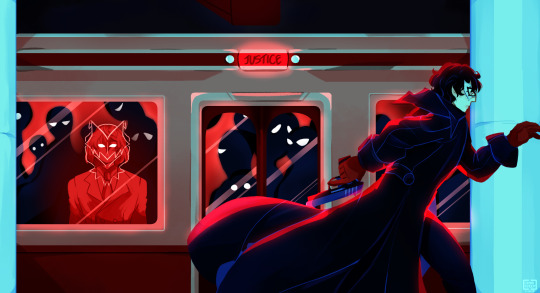
we just missed each other
#hi everyone . enjoy art that is based on my warped perception of them#bc i only just started november in p5r .. i think im only uhhhh 11/5#so idk their dynamic fully yet but i see the appeal . they are silly#like i know a few spoilers (obviously) but like idk akechi confuses me i have no idea what his end goal is LOL#he is out here . anyways thanks for listening to me ramble goodbye#persona 5#persona 5 royal#p5#p5r#persona 5 fanart#p5 joker#p5 akechi#akira kurusu#ren amamiya#goro akechi#shuake#my art#sorry for writing an essay in the tags . much love#persona 5 spoilers#persona 5 royal spoilers
602 notes
·
View notes
Text
look, not to be a hater but the whole ekko/jinx alternate universe situation only proves that jinx was only ever loved entirely and completely by silco, that's kinda the point of how tragic jinx really is as a character,
vi either only sees her little sister out of guilt/sense of duty mixed with a desperate need to come back to something or as consequences to her own actions(taking away agency from jinx in the process);
ekko sees her through the eyes of an idealist which is exactly what he is and that's not bad by itself, but it makes her either A Problem or Someone That Needs Saving, that's what's going on in his head after that AU he transported to. he's comparing jinx to powder and he likes powder much better, so he wants jinx to be powder or to reignite the powder in her - basically, he thinks how vi used to think;
isha is a complicated matter because she did show kindness and affection towards jinx that wasn't equal to anyone else's, it was pure and idolizing, she loved what she knew of jinx.
the people of zaun don't love her, not by a long shot. she became a symbol to some(as we can notice in the reunion by vander's statue) and overall the assumption that she would get involved more after her attack and silco's death is a fair one; that doesn't mean they like her,
sevika maintains a connection to jinx through grief and a sense of helplessness along with familiarity, silco's death affected jinx's psyche but it also affected sevika's dream of zaun, they feel left behind by him;
vander... well, he only got to see powder and warwick quite literally just had the memories,
the ONLY character we see that meets her as powder and stays with her as jinx is silco; yes, he isn't a good guy and he does cause the whole separation, he sharpened her edges to make her into a weapon, he lied to her and manipulated her at times, none of these things exclude the fact he does love her so strongly, with zero conditions.
she fucks up in missions, she does as she pleases around zaun, she kills their people, she stabs him in the eye, has psychotic episodes and breakdowns, she kidnaps him, ties him down, SHOOTS HIM, she doubts him and his love, keeps running after the past when he's done everything to strengthen her and she was, at a point, the only thing keeping him from his dream of an independent zaun - none of these perceived sins and flaws made him wish for anyone other than her, as she is.
all silco wanted was to keep her, while everyone else either wants another version of her or none at all. that's the tragic part, even if she suddenly decided to be good, she would feel like a burden for not being entirely like people want her to be.
#sorry not sorry but there's no happy ending here#loving someone without accepting how they've changed(for better or worst) isn't loving at all. it's cruel even.#also after the attack on the council vi treats her like a mistake she has to get rid of???? and that was vile#i simply can't forget that#yes i'm biased cause i dont like ekko and i ship jilco. this is literally the Why Im Biased About This Piece Of Media Essay website#so maybe chill idk#before anyone says it#loving doesn't mean condoning. but you gotta at least acknowledge their flawed personality. who they are instead of who they could've been.#yes u can hope for change but jinx isn't a mask powder keeps. she's violent and highly insecure and apathetic. she's needy and childish.#she doesn't care for whatever is happening to zaun or piltover. there's no difference for her they're all fleshbags that could hurt her.#at her core she won't suddenly start giving a shit to people. that will never happen. and she won't look up to someone 'good'#or ever stop being so high maintenance so needy and possessive. trauma won't ever just puff outta existence.#god these tags are so long#imma shut up now#arcane spoilers#character study (?)#arcane season 2#this is my opinion#if you don't like you can just disagree on ur mind and ignore me#make ur own post or smth idk#arcane jinx#arcane powder
42 notes
·
View notes
Text


wait, that elias?
#huge shoutout to @sepezzz elias design this is very much inspired by it. go look at it#im so serious if i never draw another person manspreading in a fucking office chair it’ll be TOO SOON#anyways.#the juxtaposition truly is crazy hahaaha right people change in the weirdest of ways#i like thinking about how they both present themselves. elias understands he works at Important Academic Research Facility so he still#sooort of tries to look somewhat official. but well he also gets away with what he can#he has that vibe of Yeah i work here and im kind of important but i’m chill. i know how to chill#meanwhile that other freak is just like i am going to make this body look presentable or so help me god.#he’s the Head of the Institute he can no longer have whimsy okay. and listen it’s not because i think jonah is that boring and would#dislike piercings and funny socks or whatever. i think he’d like those. but see he needs to make this believable that elias truly has#changed okay. and also like i said he is the Head of the Institute he needs to look Super Normal And Unremarkable#anyways i think it’s funny how elias’ whole thing is that he tries to distance himself from his family image and tries really hard to Not#end up like a rich asshole. and then. well.#(looks around) So i think about this man a normal amount.#i could write like 20 thinkpieces on both of them but instead they’re gonna make me do college essays about like language and shit.#myart#the magnus archives#tma#elias bouchard#oh my god it is actually un fucking believable how much i think about him every day#if this becomes a daily elias blog yall will just have to deal
63 notes
·
View notes
Text
Do you think after the triplets first moved in, Scrooge was just-
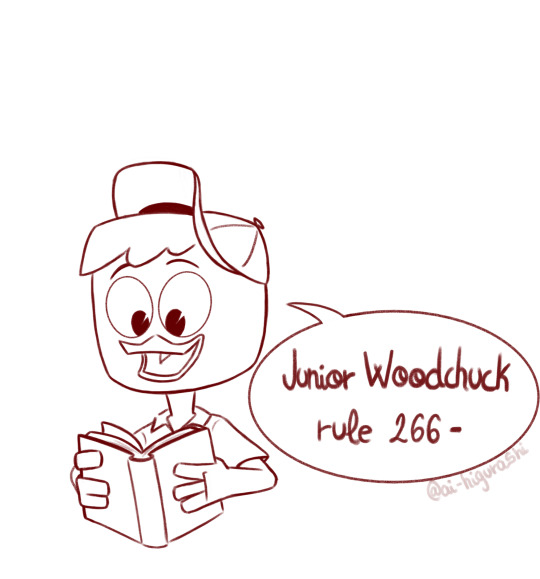
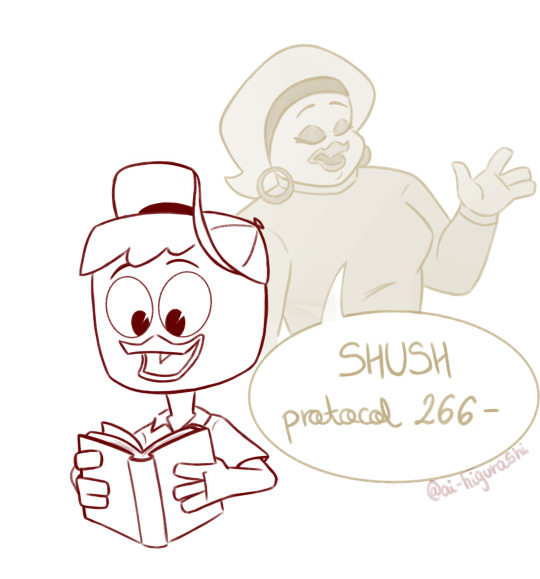
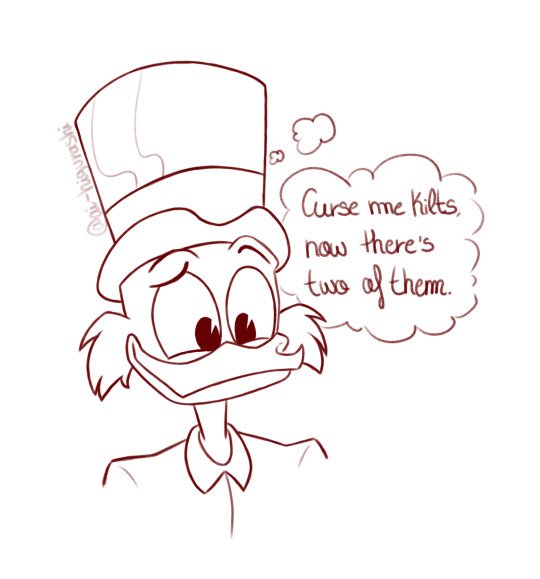
#ai's random art#bentina beakley#ducktales 2017#ducktales#mrs beakley#scrooge mcduck#huey duck#going around shaking people by their shoulders like LISTEN-#once again spreading the Beakley-triplets agenda#Beakley seeing Huey go through a similar arc as she did after meeting Scrooge like 'first time?'#I'm sorry but Scrooge definitely saw Huey with his guidebook and had a déjà vu like 'ah shit here we go again (affectionate)'#I'm just saying. Huey could definitely get Beakley to end up knowing his guidebook by heart too just by infodumping at her#have a whole incoherent essay about how they could work#OKAY SO APPARENTLY THIS IS MY 100TH POST? HUH
565 notes
·
View notes